Vietnam
Hanoi
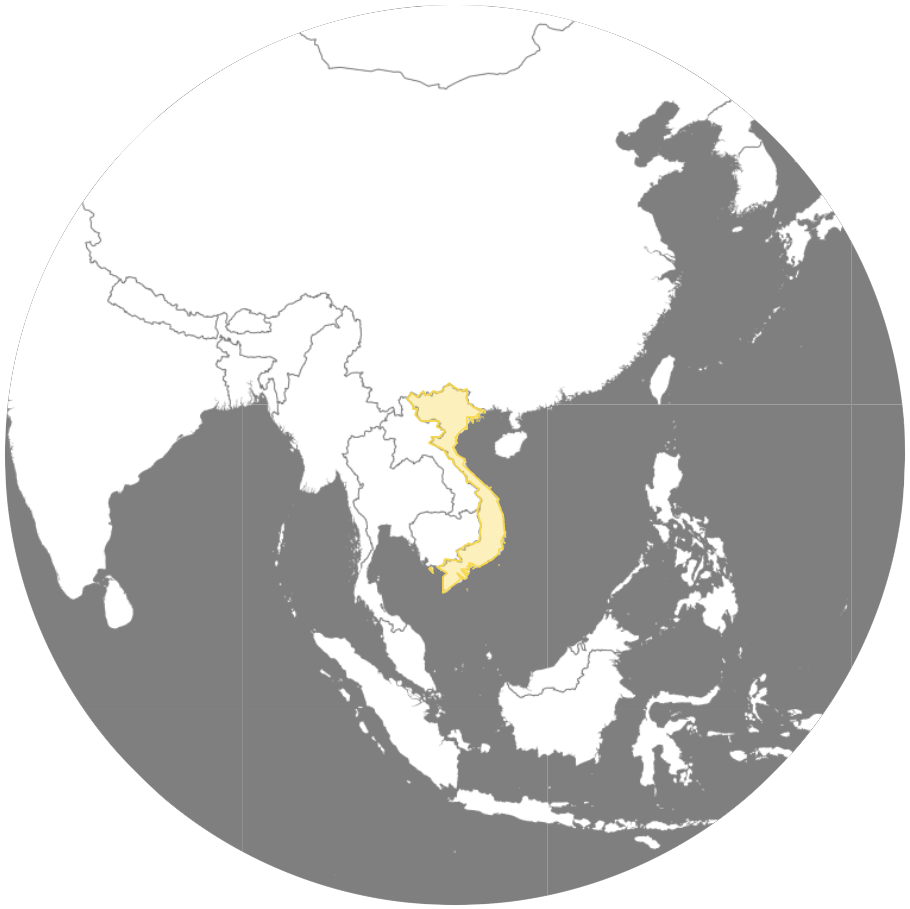
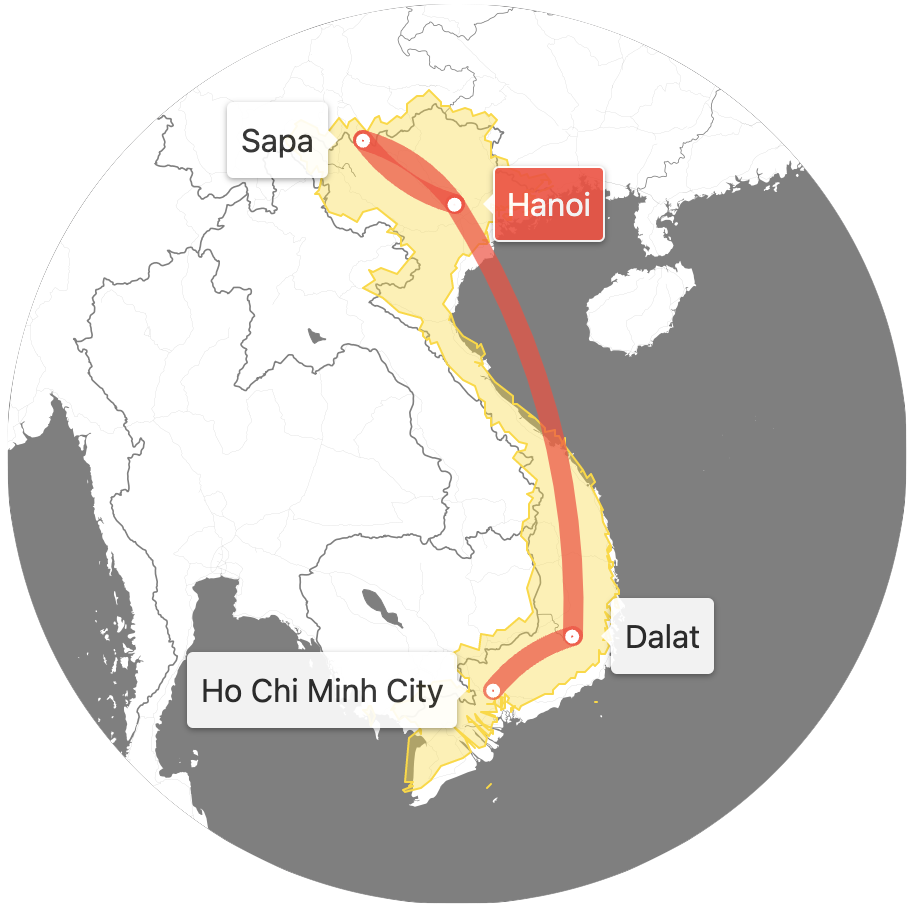
We started our Vietnam trip in Hanoi, the country’s capital and northern hub. After just one day there, we’d take a weekend intermission to the mountainous city called Sapa before returning to Hanoi. I’m grouping the time spent in Hanoi into one post for simplicity.
Vietnamese Words
While planning travel to Vietnam, I kept encountering city names written as multiple words. And once there and learning names of food, the same thing.
In keeping with my policy of using English names of things01 I’m going to use the more anglicized, often single-word, diacritic-less02 versions. If there’s no anglicized variant, I’ll use the name in Vietnamese (e.g., chè, bánh xèo).
| Vietnamese | Anglicized | It is a … |
|---|---|---|
| Hà Nội | Hanoi | City |
| Sa Pa | Sapa | City |
| Ninh Bình | Ninh Binh | Region |
| Đà Lạt | Dalat | City |
| Hạ Long Bay | Halong Bay | Region |
| Đà Nẵng | Da Nang | City |
| Hội An | Hoi An | City |
| Thành phố Hồ Chí Minh (TP.HCM) / Sài Gòn | Ho Chi Minh City (HCMC) / Saigon | City |
| Bánh mì | Banh mi | Sandwich |
| Phở | Pho | Noodle soup |
| Bún chả | Bun cha | Better noodle soup03 |
Hanoi
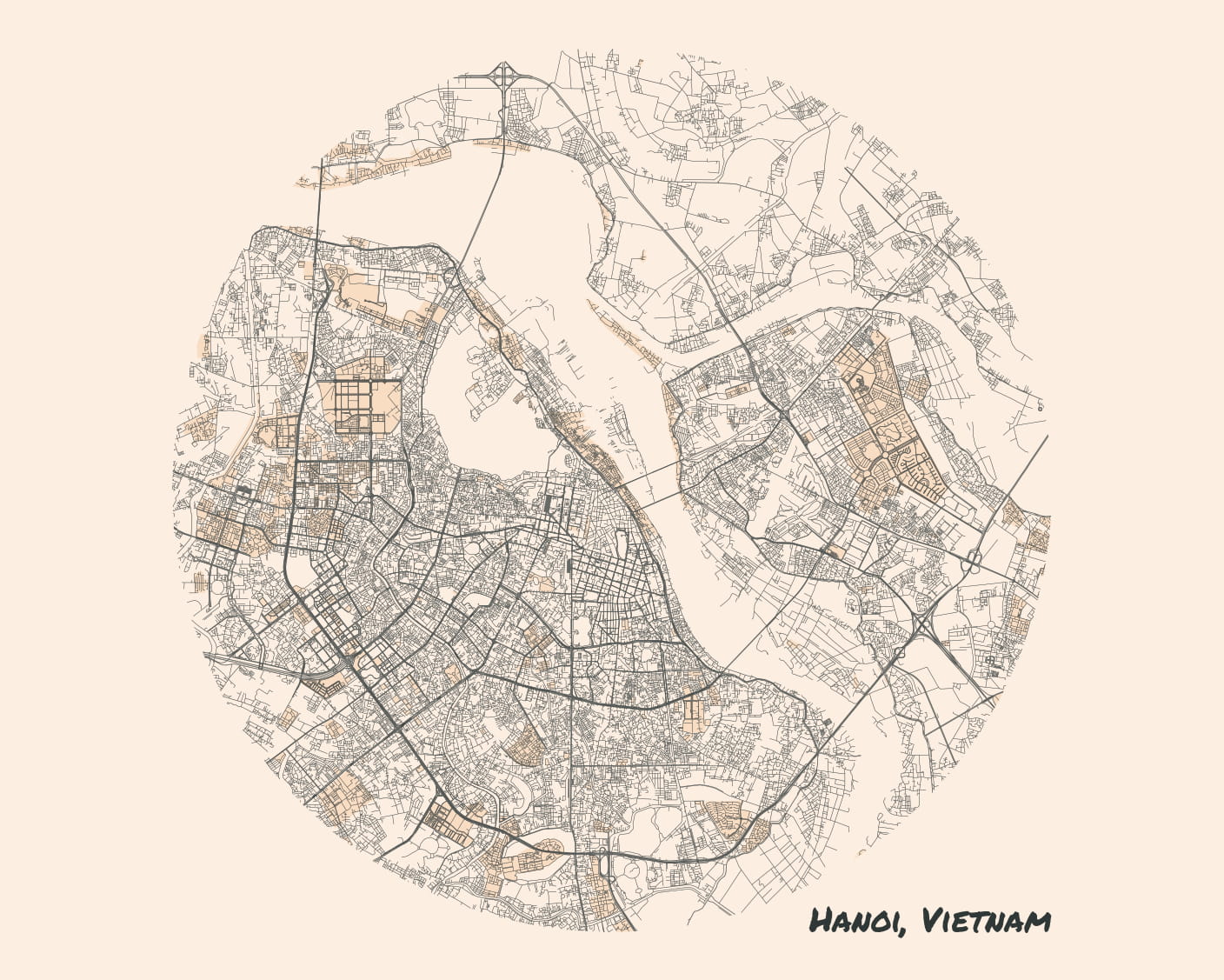
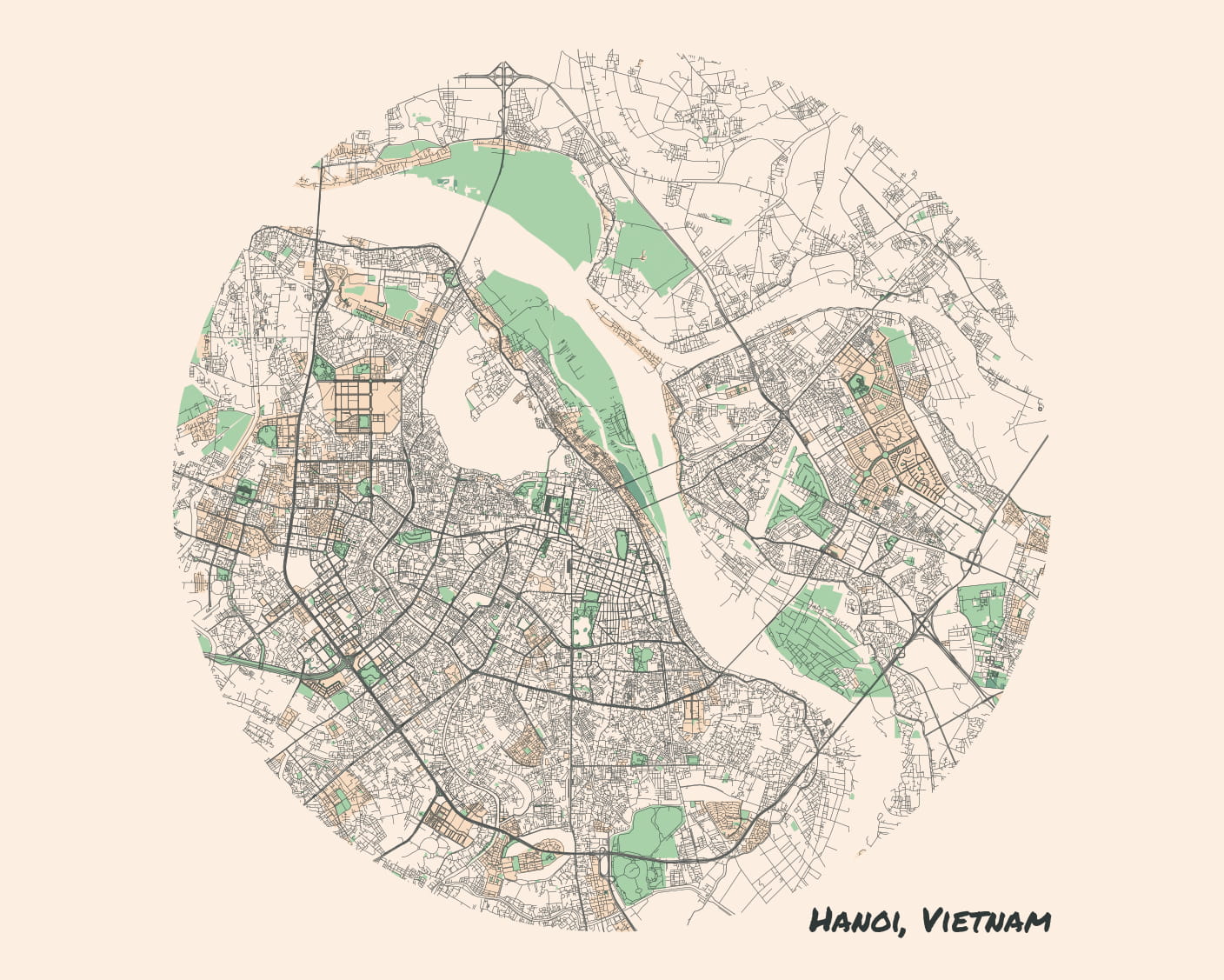
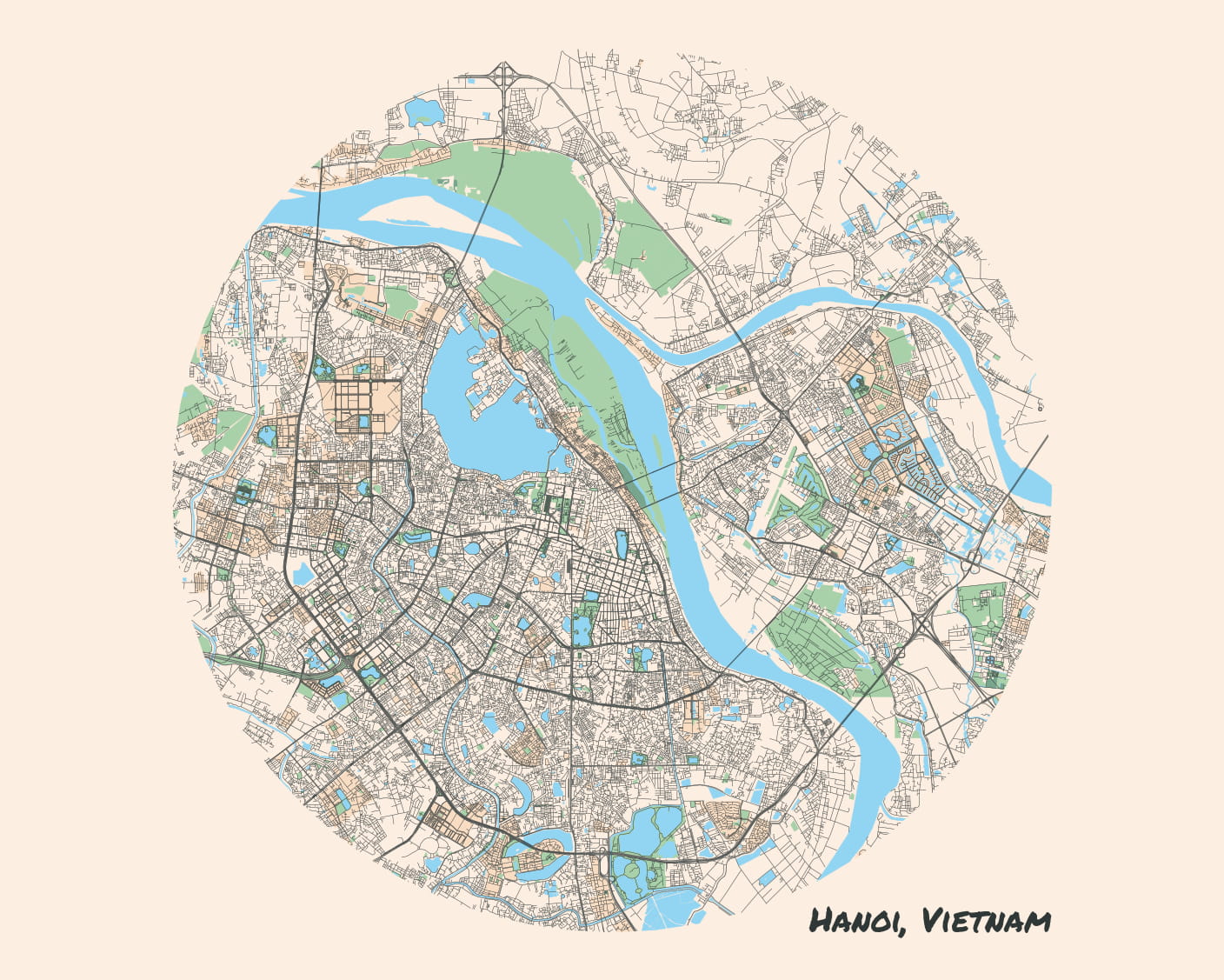
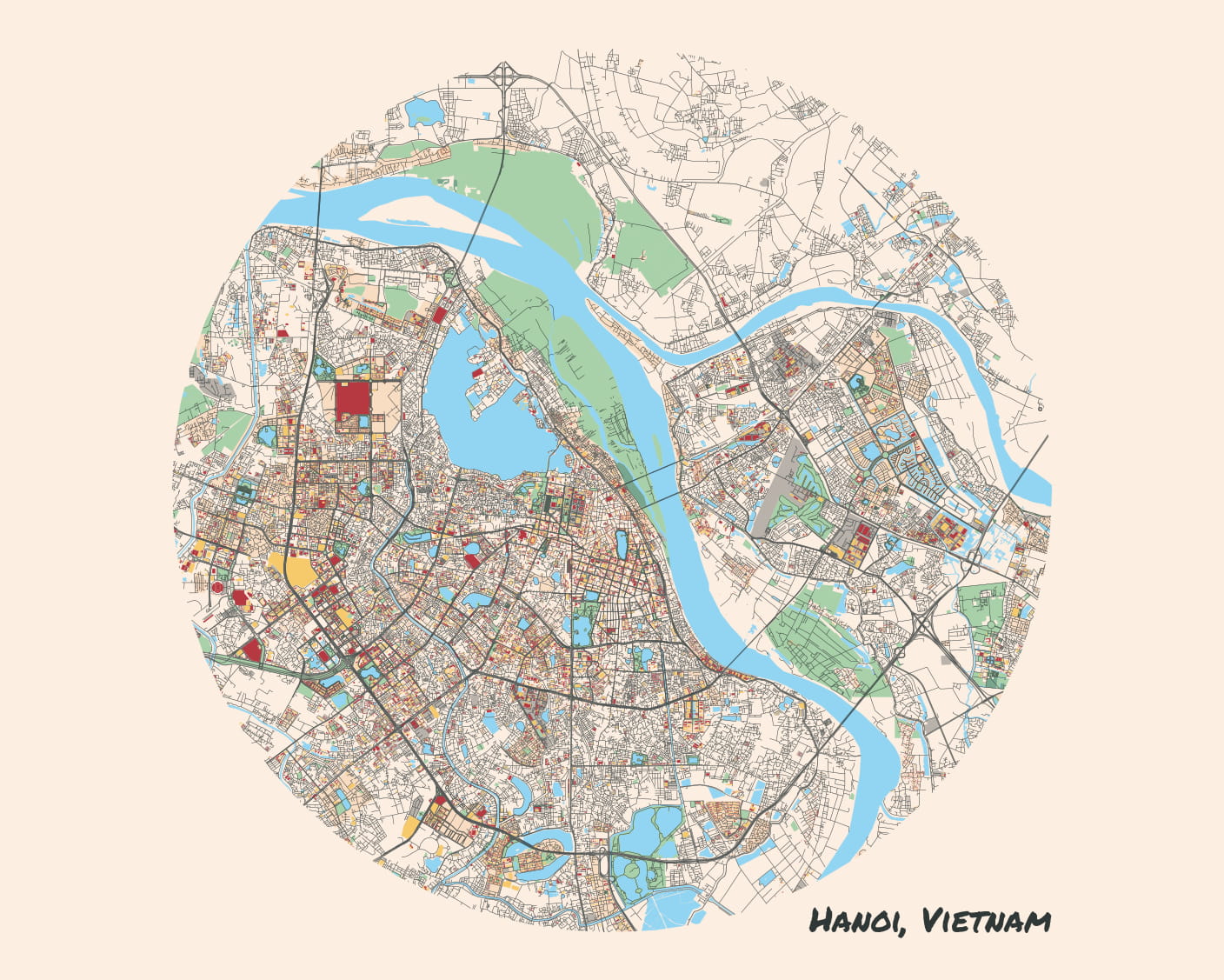
Hanoi, on paper: Vietnam’s second largest city. The nation’s capital since Ho Chi Minh’s crew of the north won the war, which they (rightfully) call The American War. Population 8 million; metro population 20 million. Ruled at points by China and France. Main area for tourists: the Old Quarter.
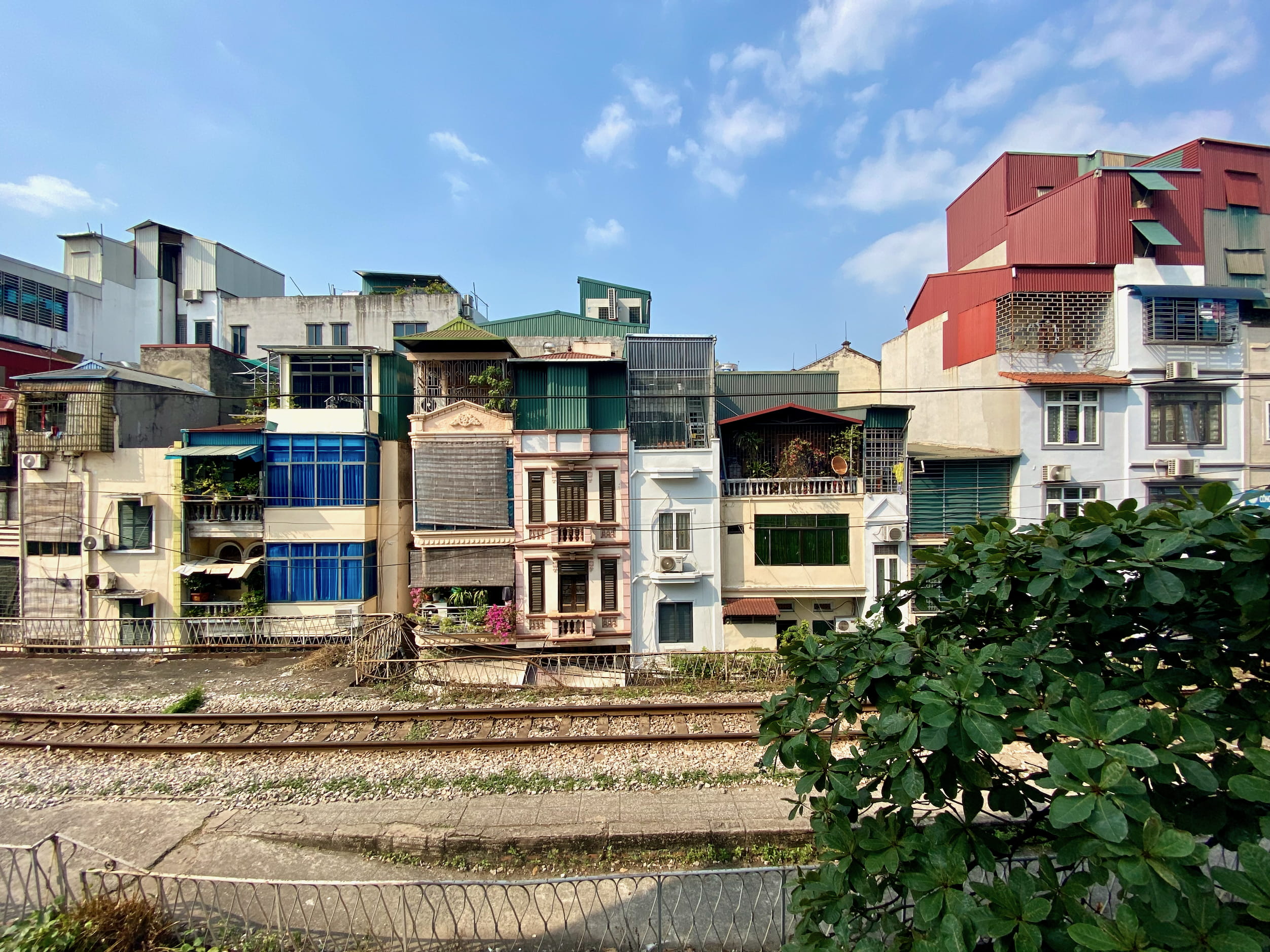
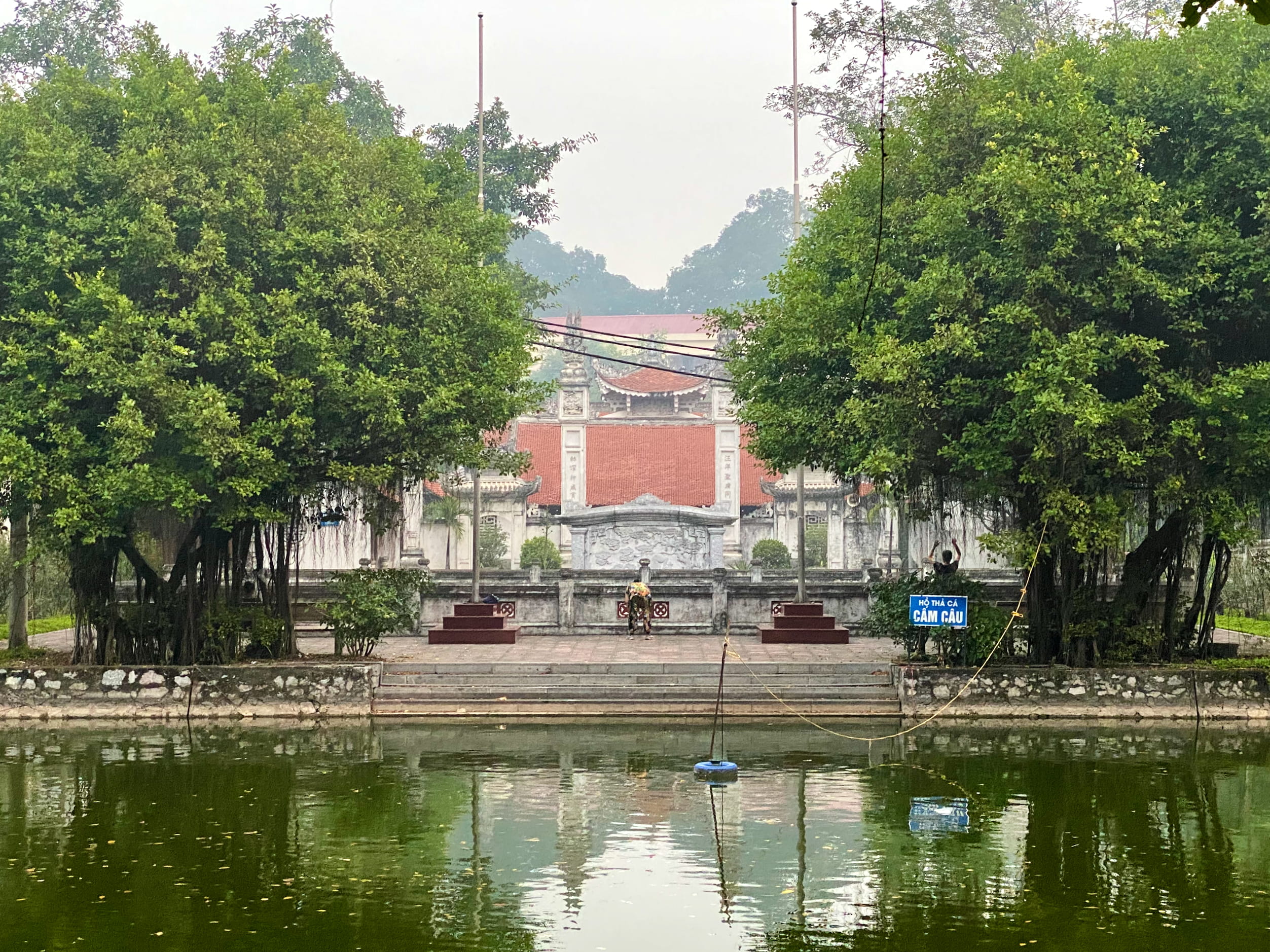
Hanoi felt full of life in a way that I could see being completely intoxicating. Every street was completely packed with dozens of independent business. There were stores and stands not only for food and drink, but metal pipes, live animals, and jewelry. Coming from Korea’s massive malls, and with a background of shopping in America’s warehouse-size grocery and home improvement stores, every business fitting into a uniform tiny room was a true feat of space efficiency.
Though, saying they fit into a room isn’t quite accurate. Because nothing quite seemed to be contained to any boxes in Hanoi. People’s goods spilled out into the street. Restaurant seating would often take up the whole sidewalk. And what wasn’t taken up by restaurants would be filled by smaller vendors and hundreds of parked mopeds. This is nothing compared to the street itself, which is shared by a handful of cars, dozens of mopeds whizzing by, and merchants pushing carts or carrying wares on sticks. Plus a few idiots like us trying to get around on foot.
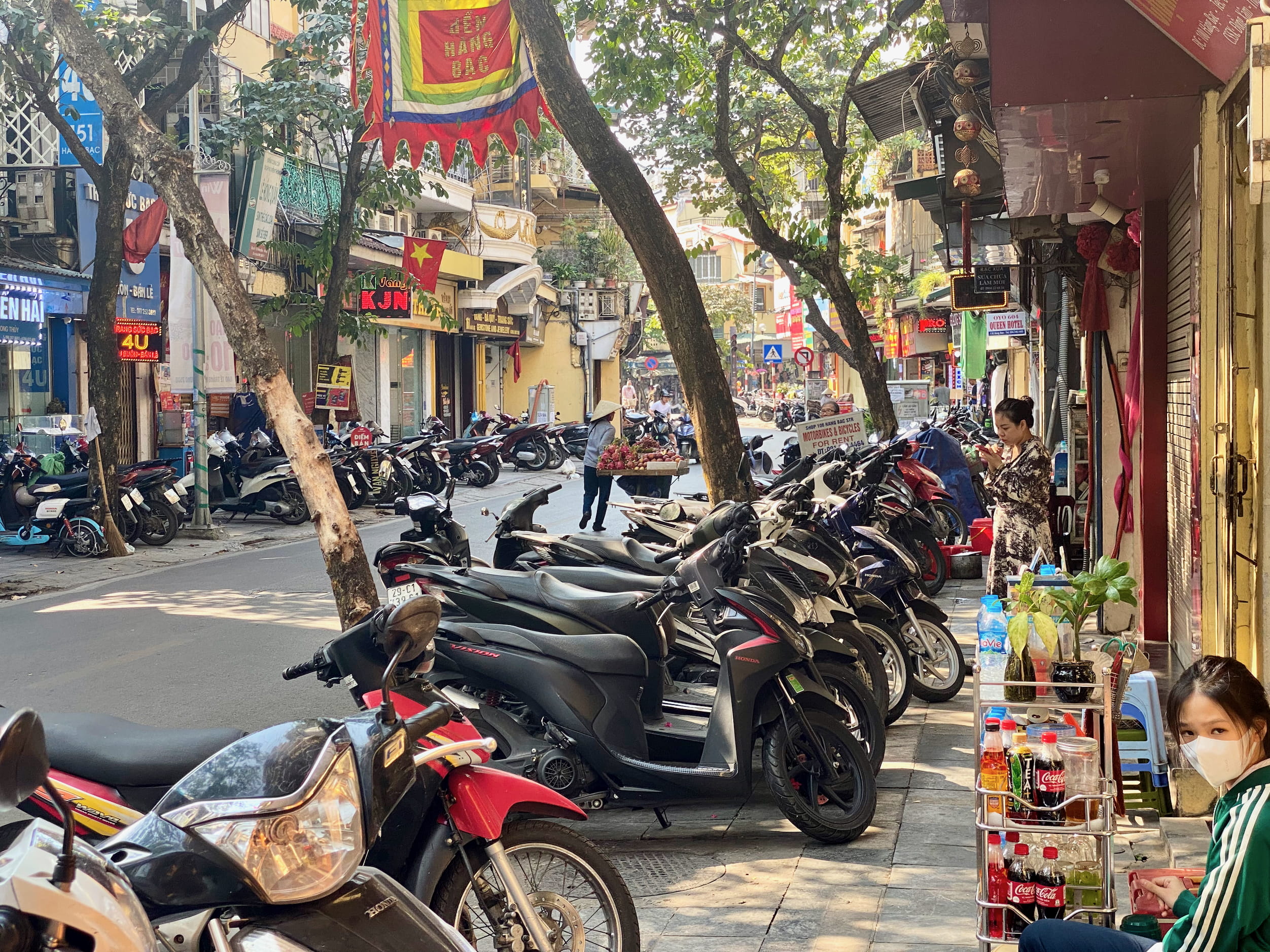
A quiet street. Extremely generous as sidewalks go: (a) there is a sidewalk, (b) there’s at least twenty feet here you could walk along.
Crossing an arterial is, as legends have it, both completely unthinkable and yet somehow totally doable. You just walk slowly. You could even close your eyes—I think the result would be about the same. Traffic parts around you.
I think if you grew up with this way of life, it’d be hard to leave it.
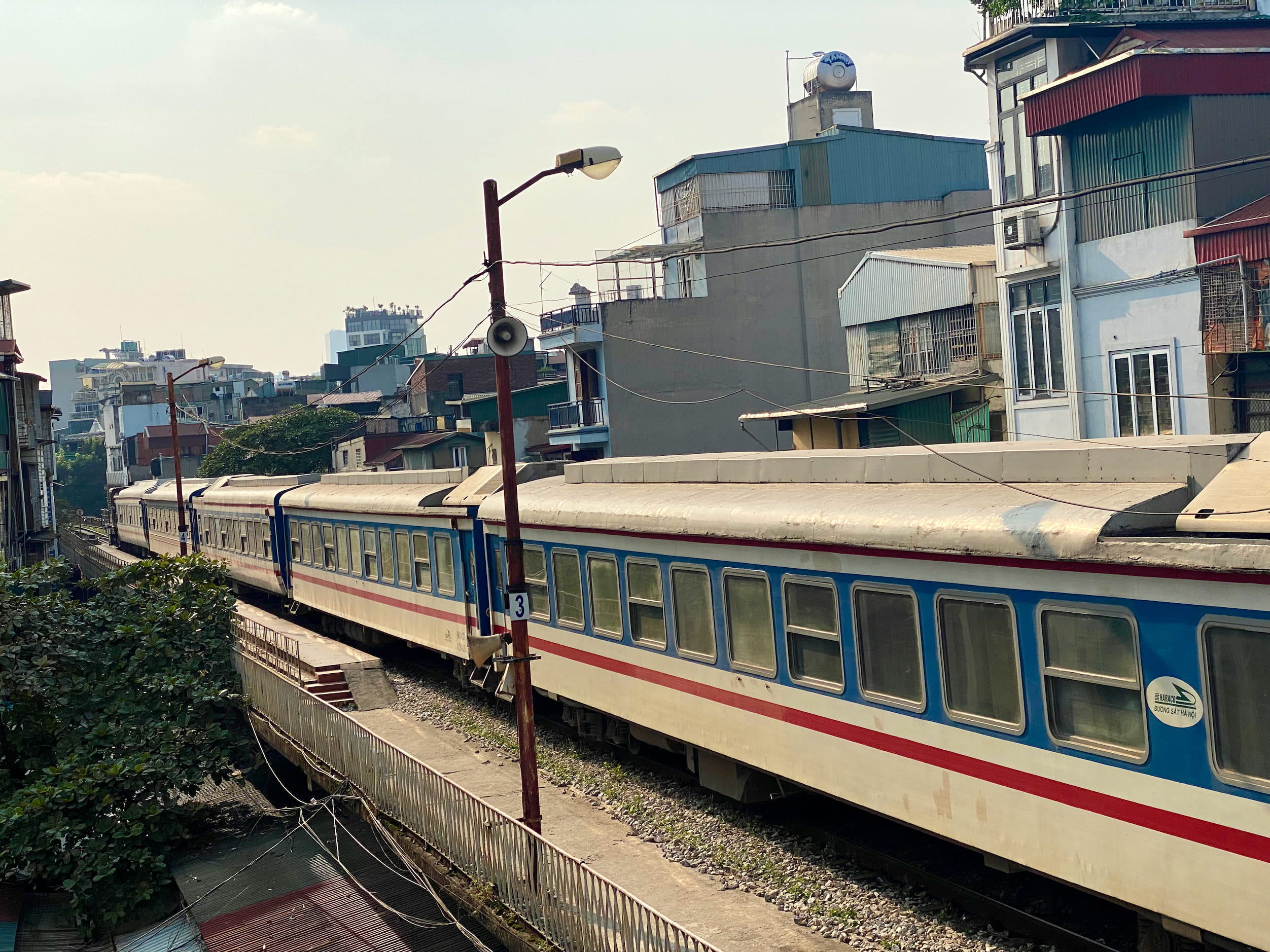
The hotel we started at overlooked old train tracks that I initially regarded as quaint, but then turned out to be the bane of my existence because they were very much active. It wasn’t so much the train going by but the loudspeakers blasting announcements in the wee hours of the morning.
For us, it was a hard city to adapt to. The first few days were overwhelming in a way nowhere else I’ve ever been was. The sheer density of people and vehicles, the unceasing noise and smog, the sudden wafts of overpowering aromas.
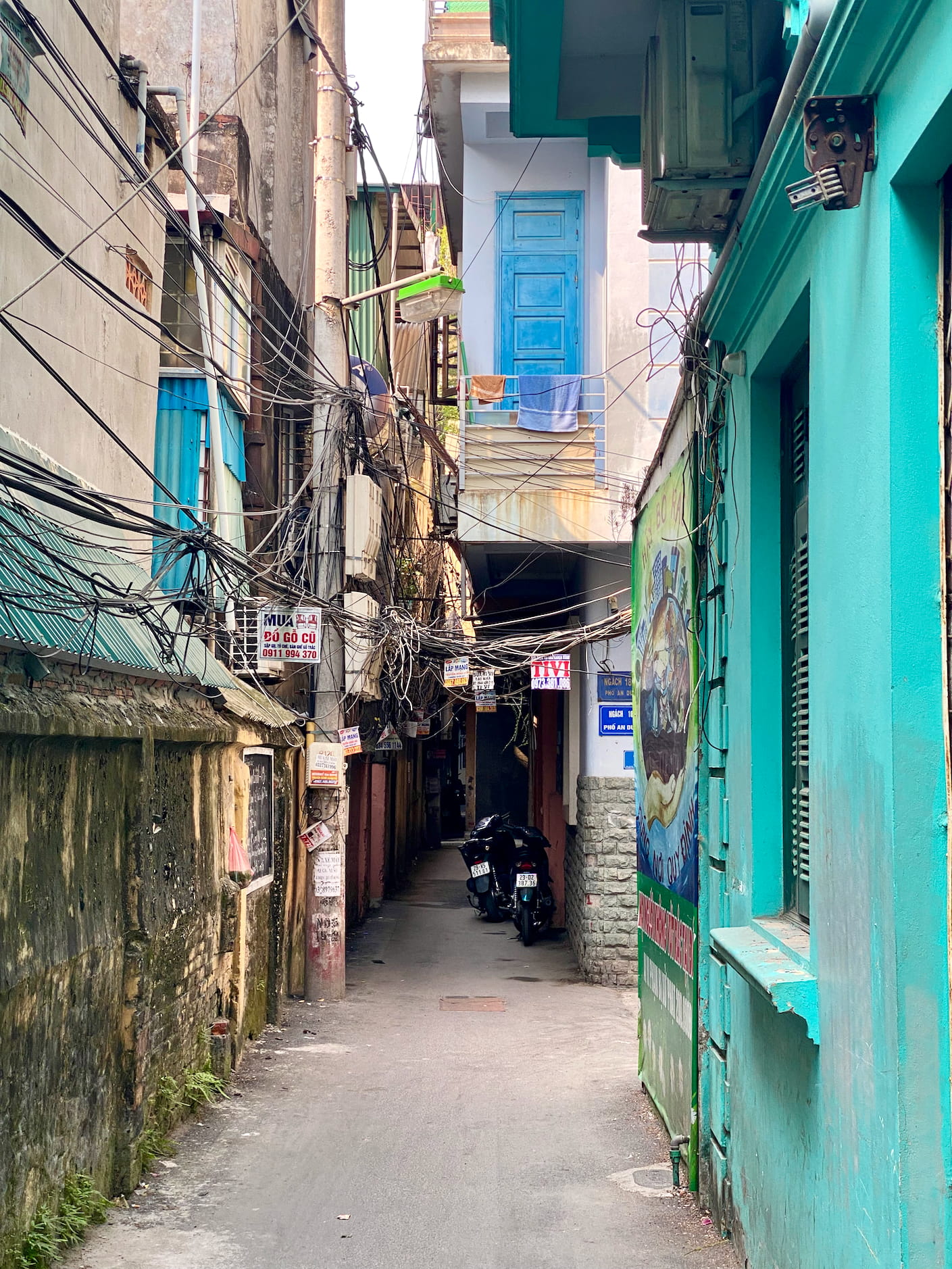
Officially Mandated Tourist Activities (OMTAs)
We tried visiting a few OMTAs in town. Went to the lake. Saw shrines piled high with biscuits and drinkable yogurt. Looked at people looking at taxidermied reptiles.
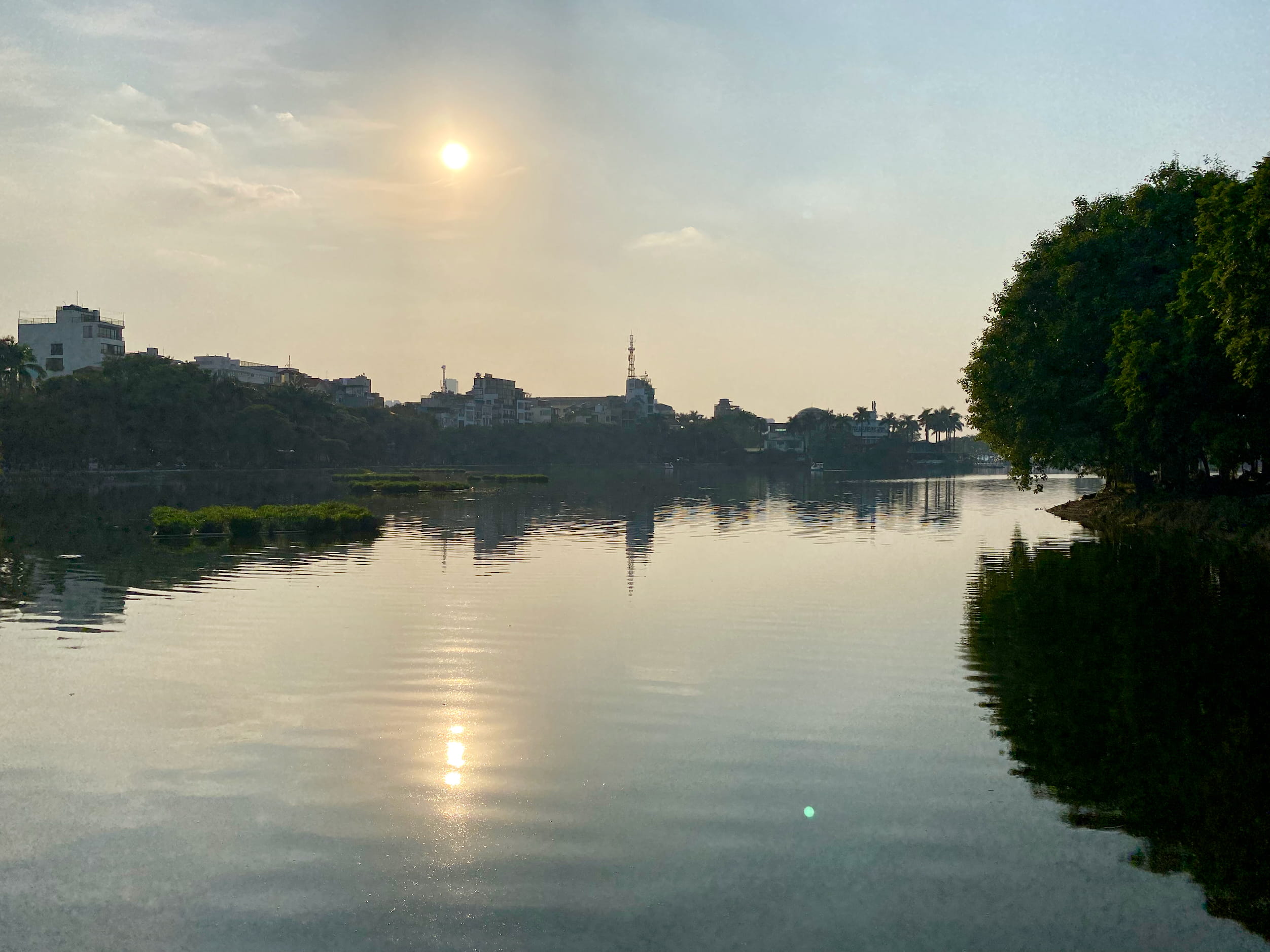
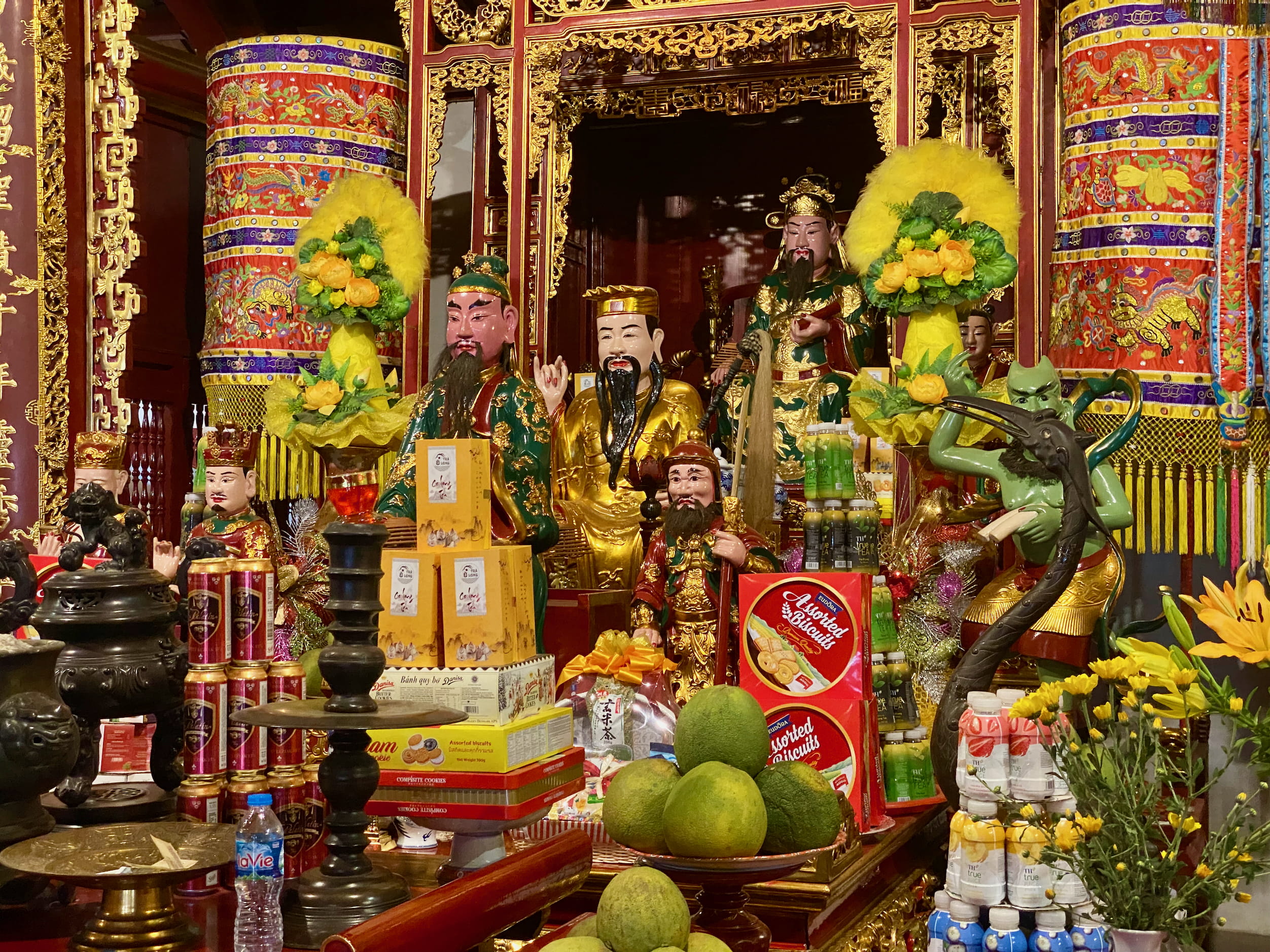
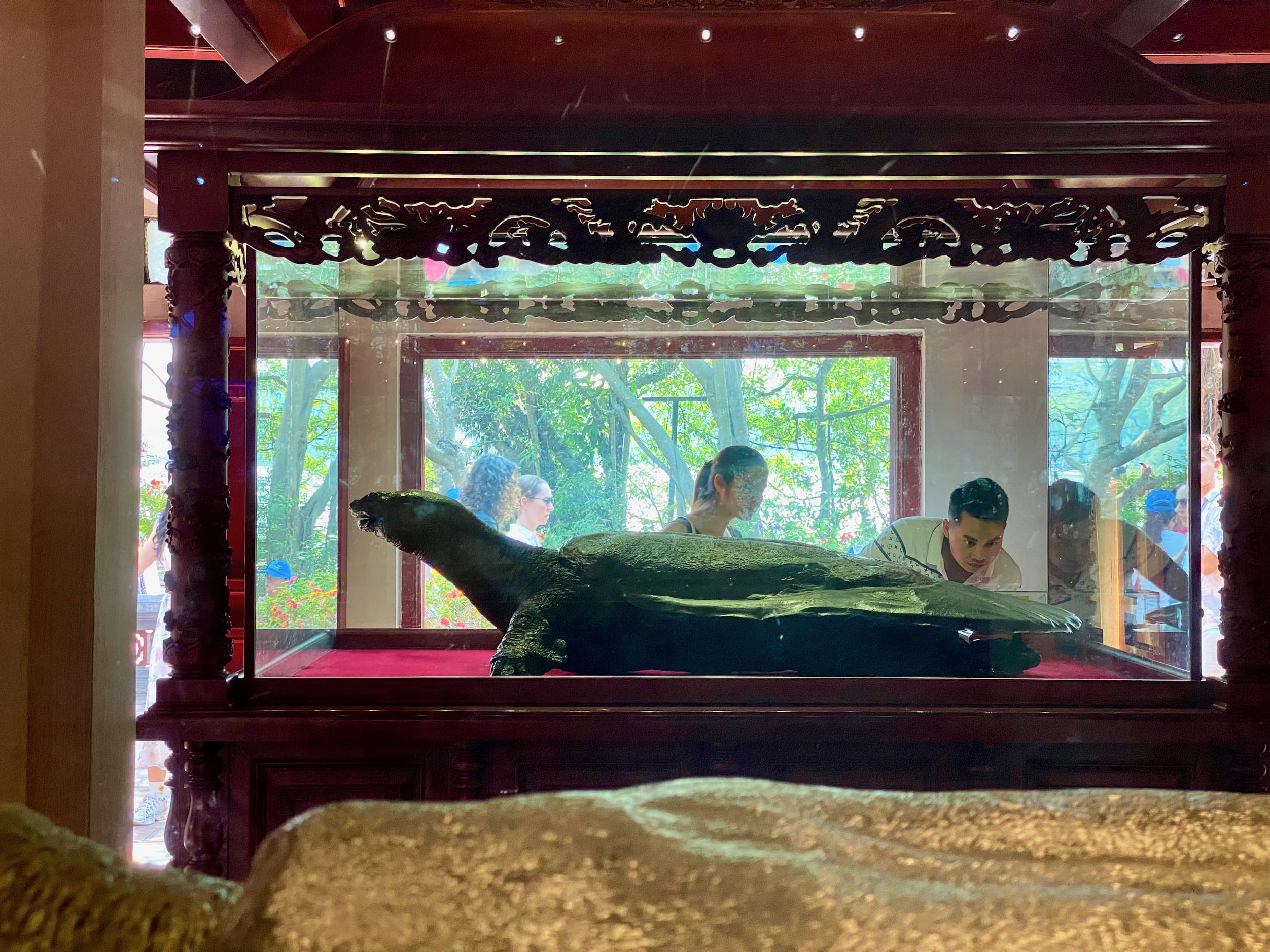
We visited my favorite genre of tourist activity, which is going to the top of the local very tall building. But even that proved a bit tricky to enjoy because the thick smog blanket obscured any geographical insights.
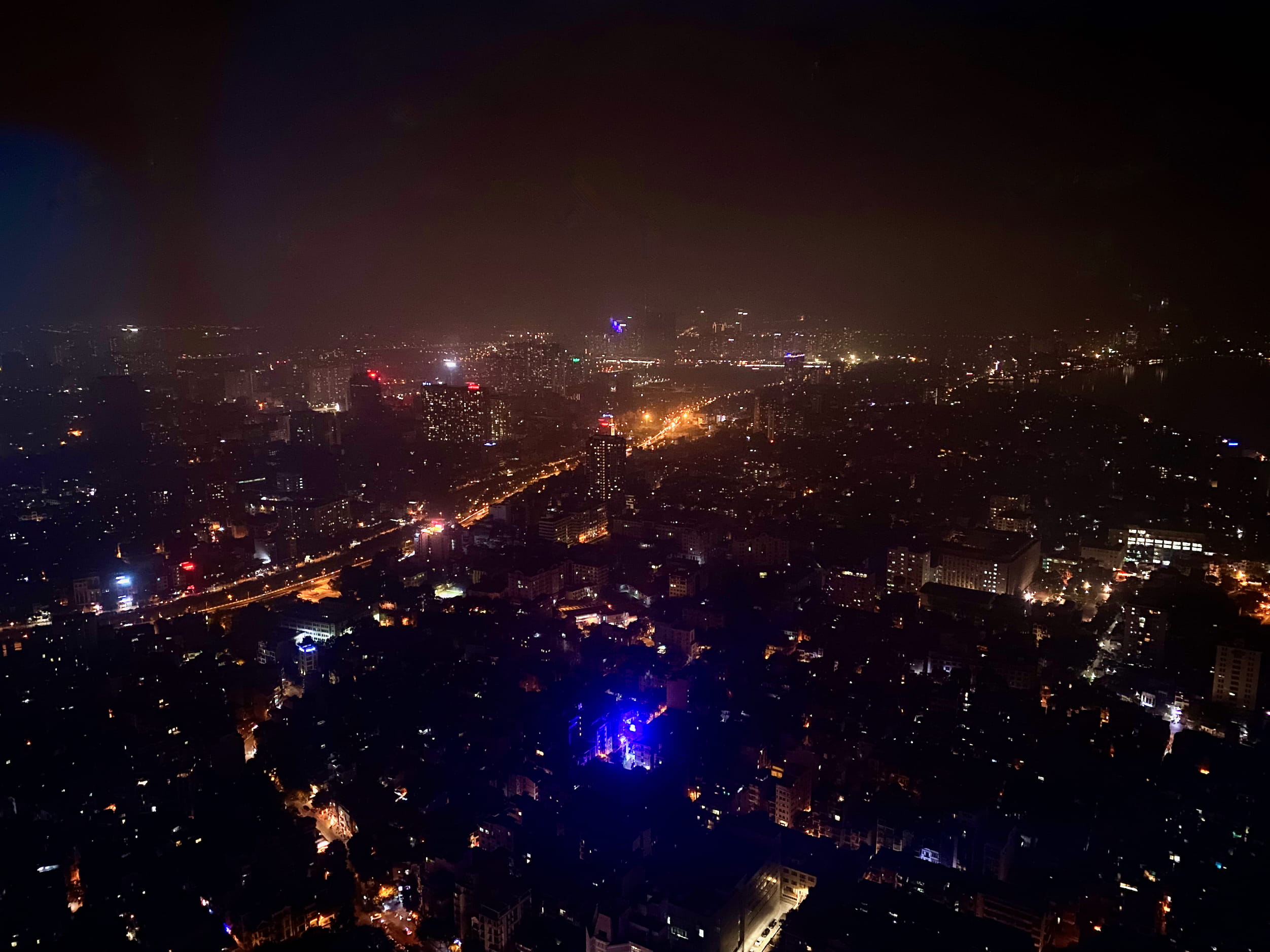
Tourism-wise, Hanoi mainly serves as a hub for the handful of 1–2 day trips nearby which are northern Vietnam’s main OMTAs. When in Hanoi itself, I found the city itself much more interesting than the OMTAs. As usual, if you have time, I think the formula goes: check em out (pagoda, lake), stroll through the tourist zone (Old Quarter), and then get out and see the real city.
I’d now like to introduce my two favorite parts of Hanoi, which are eating food and riding mopeds.
Food
Before I went, I didn’t think I could possibly miss Vietnam’s food as much as I have. I often feel like I’m the only person in Seattle who doesn’t like pho. And while I’m as into banh mi and vietnamese iced coffee as much as the next person, I didn’t expect to be daydreaming of Hanoi-style bun cha for months after the fact.
If I had to pick one secret weapon for the food, it would be the herbs. Piles and piles of fresh herbs are given alongside dishes.04 But a close second would be the expertly grilled meats, often cooked down the road from the shop itself by old women squatting around charcoals. And third is the sauce. The perfect balance of salty, fishy, and—surprisingly—sweet, broths had an addictive perfection.
Oh, and did I mention it was cheap? Korea was pretty good, but Vietnam is on a whole different level. We’re talking $1 or $2 for an incredible and filling lunch.
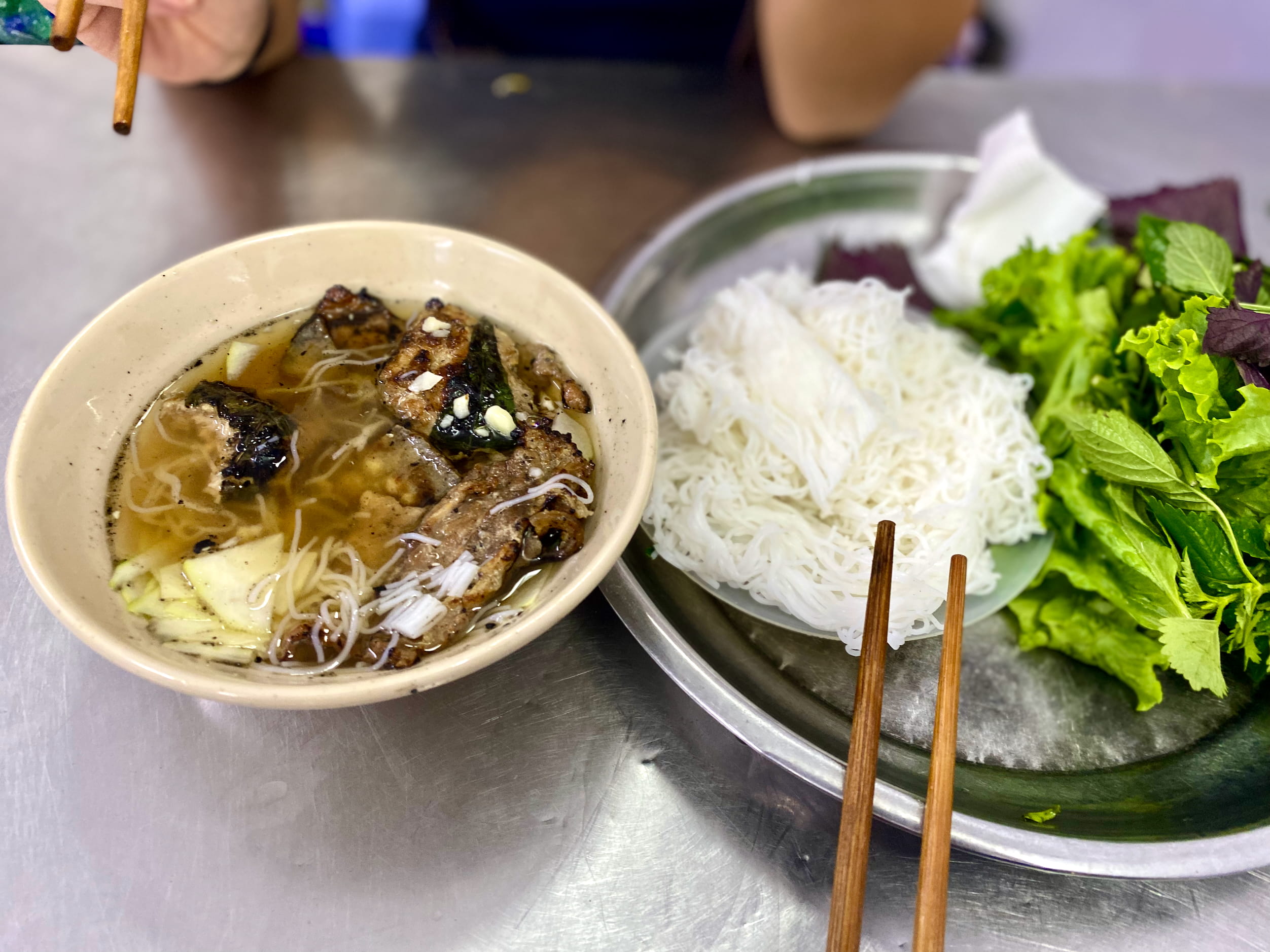
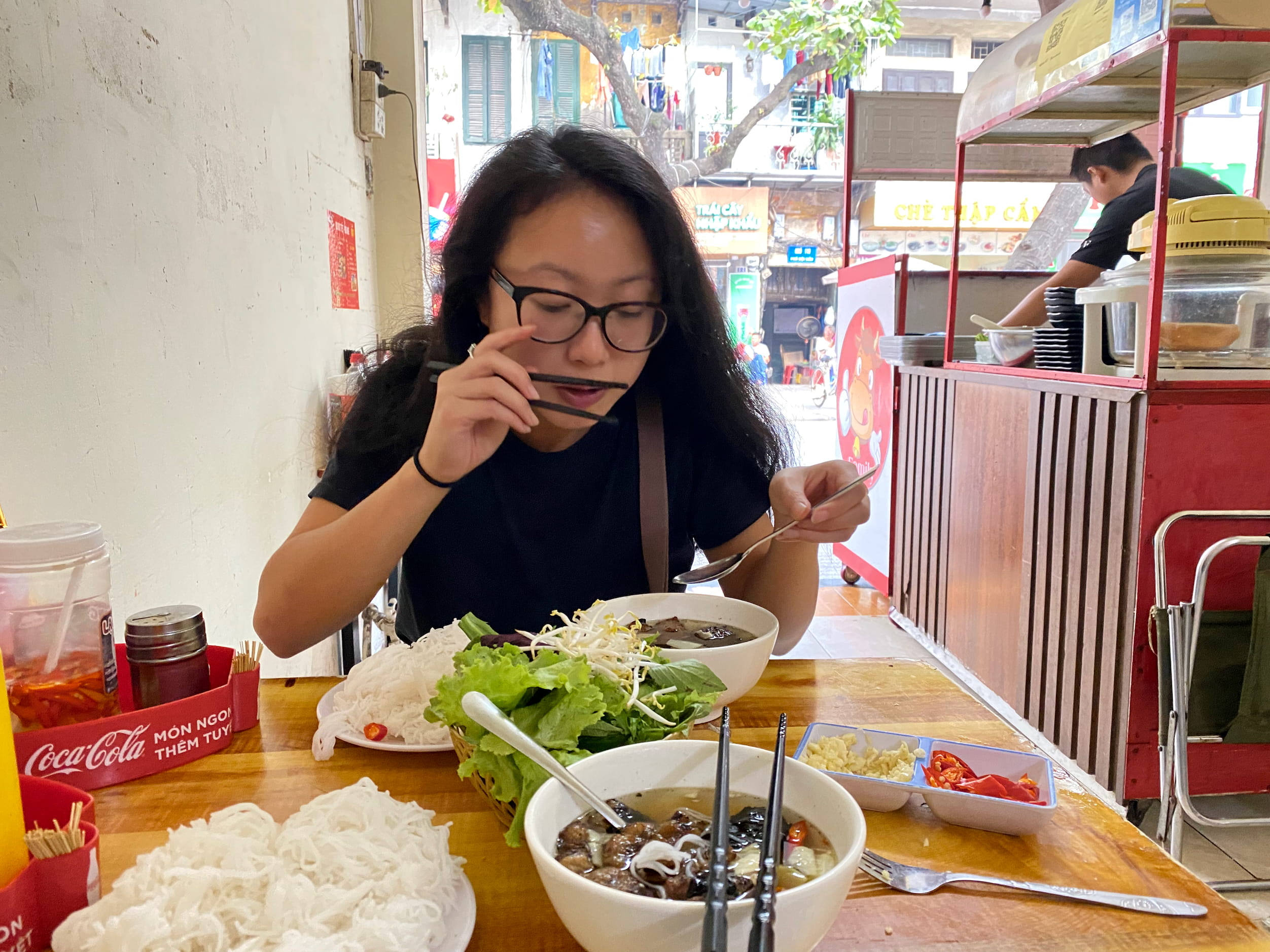
Bun cha, hanoi style. You dip the noodles at will into the broth that’s full of grilled meat. Add vegetables and herbs as desired. Heaven.
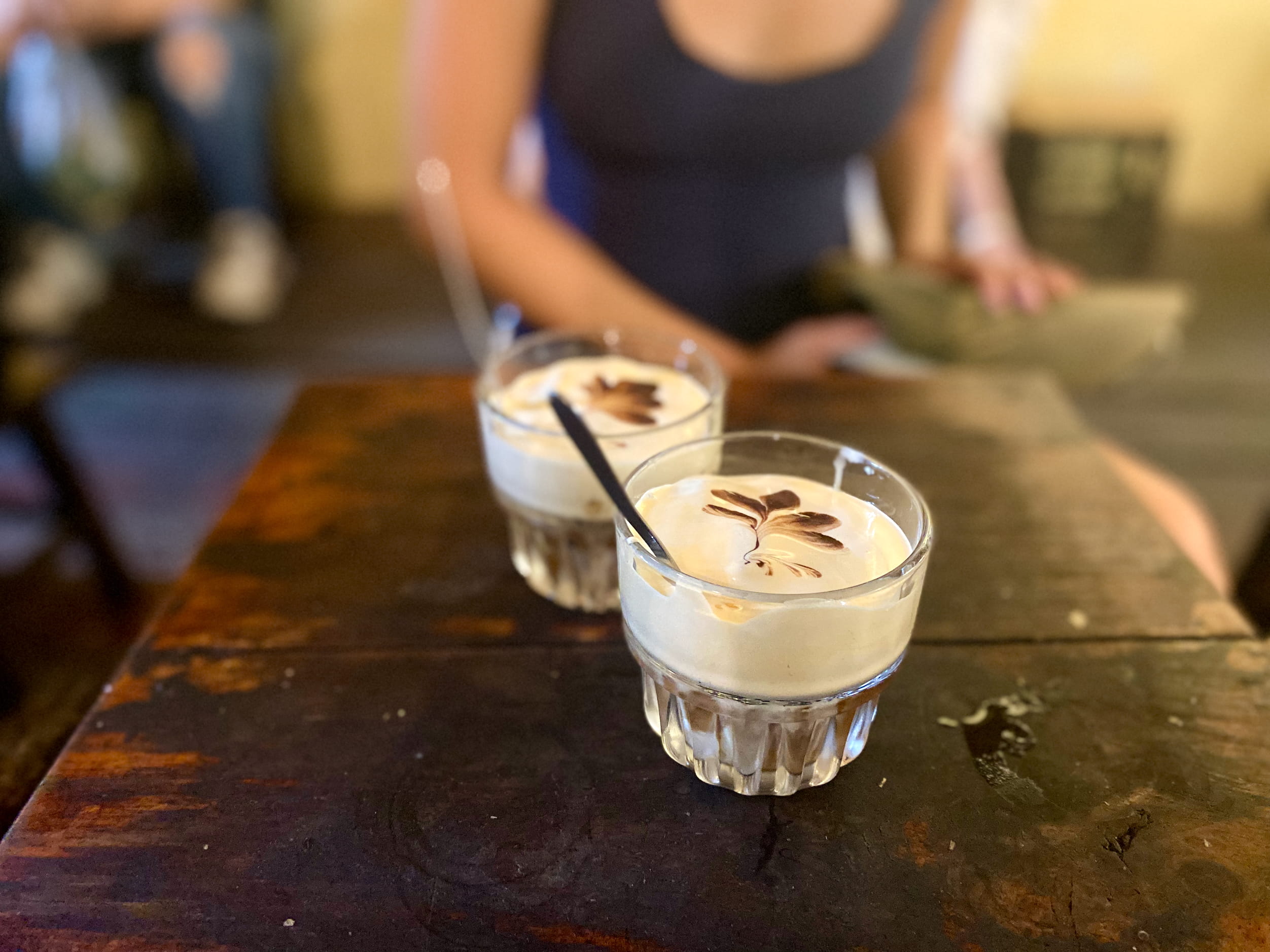
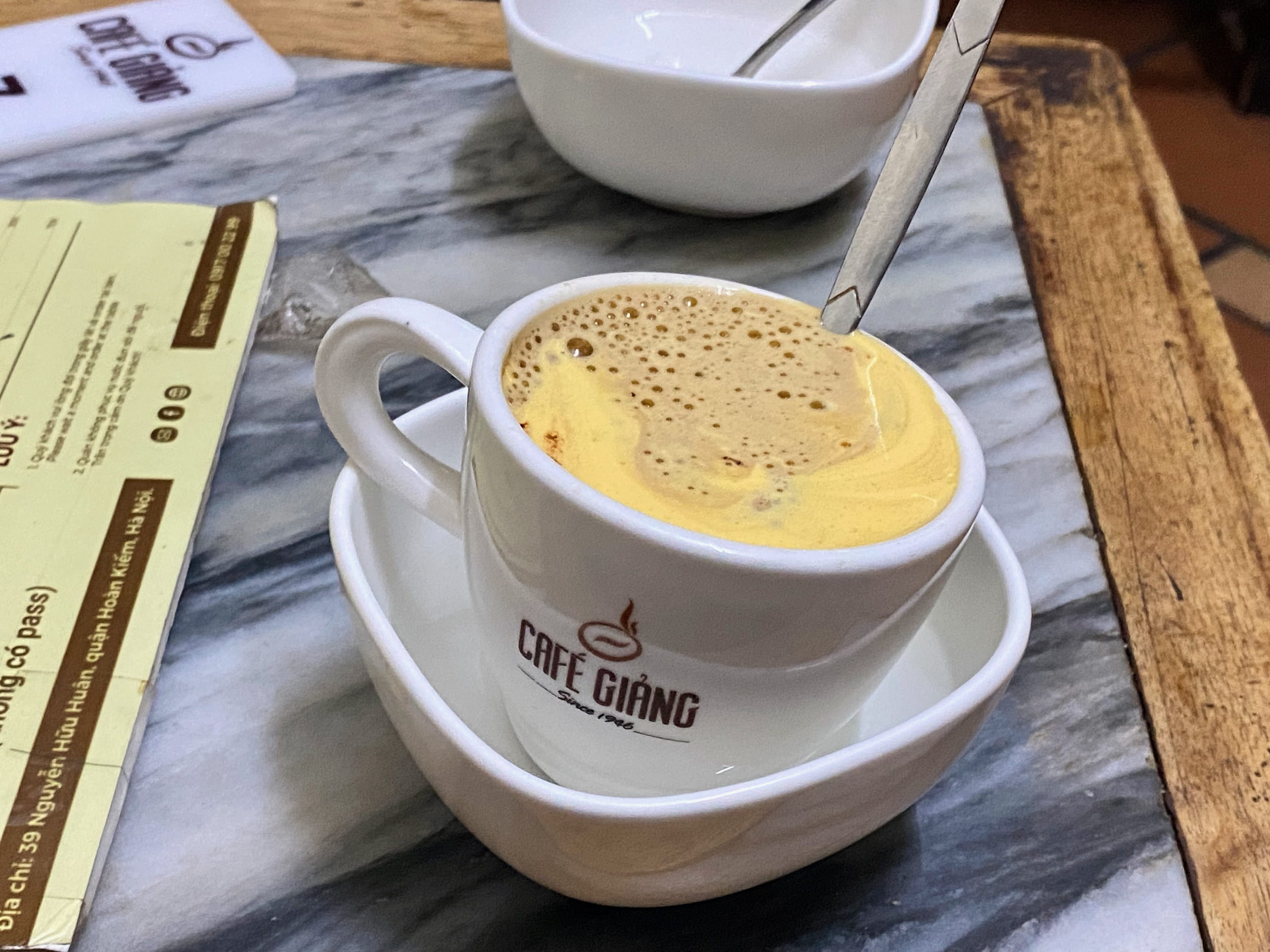
Egg coffee, a local specialty. Note the second one that came in a tiny bath of hot water to keep it warm.
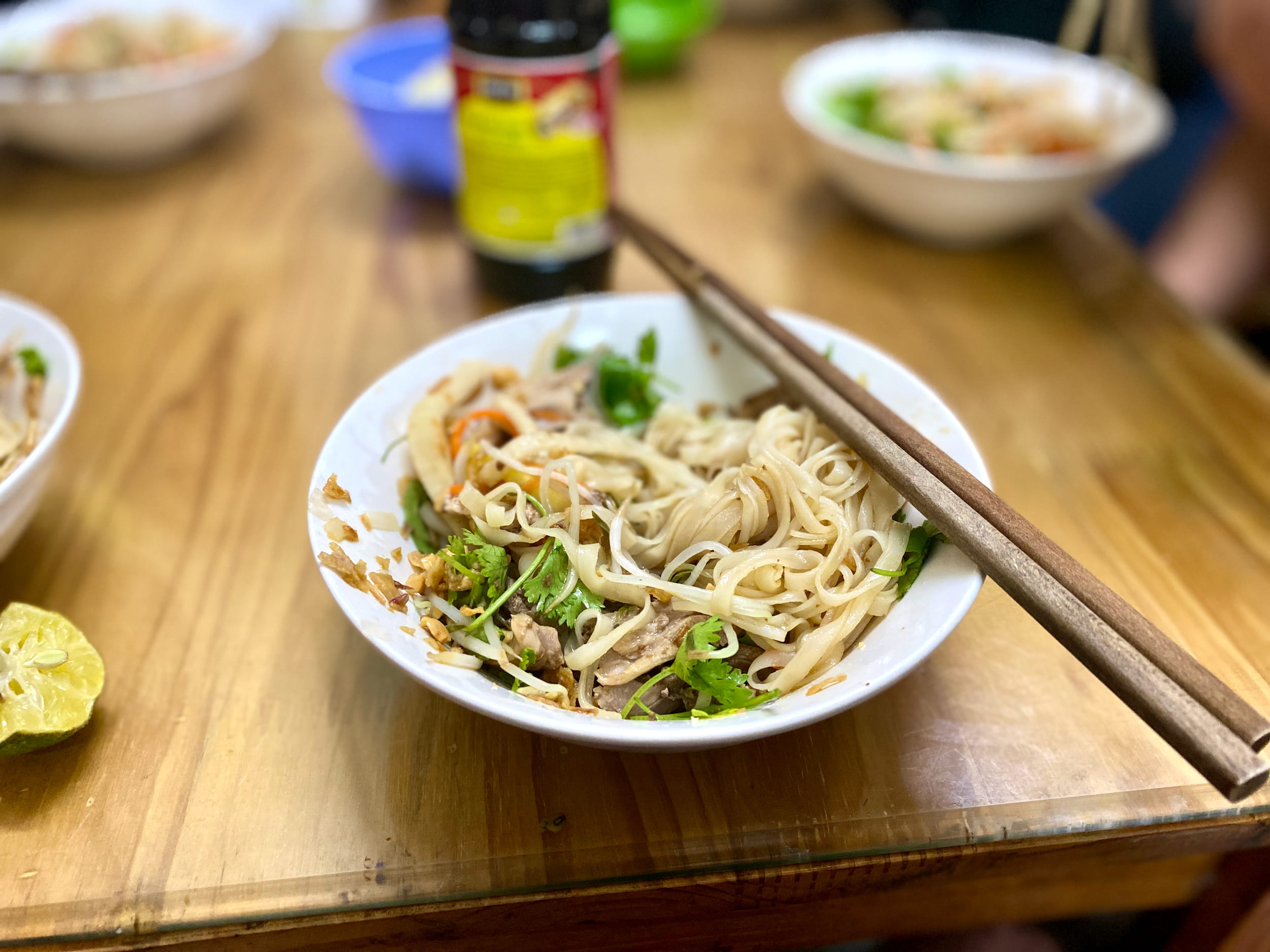
Dry pho. First pho I have ever liked.
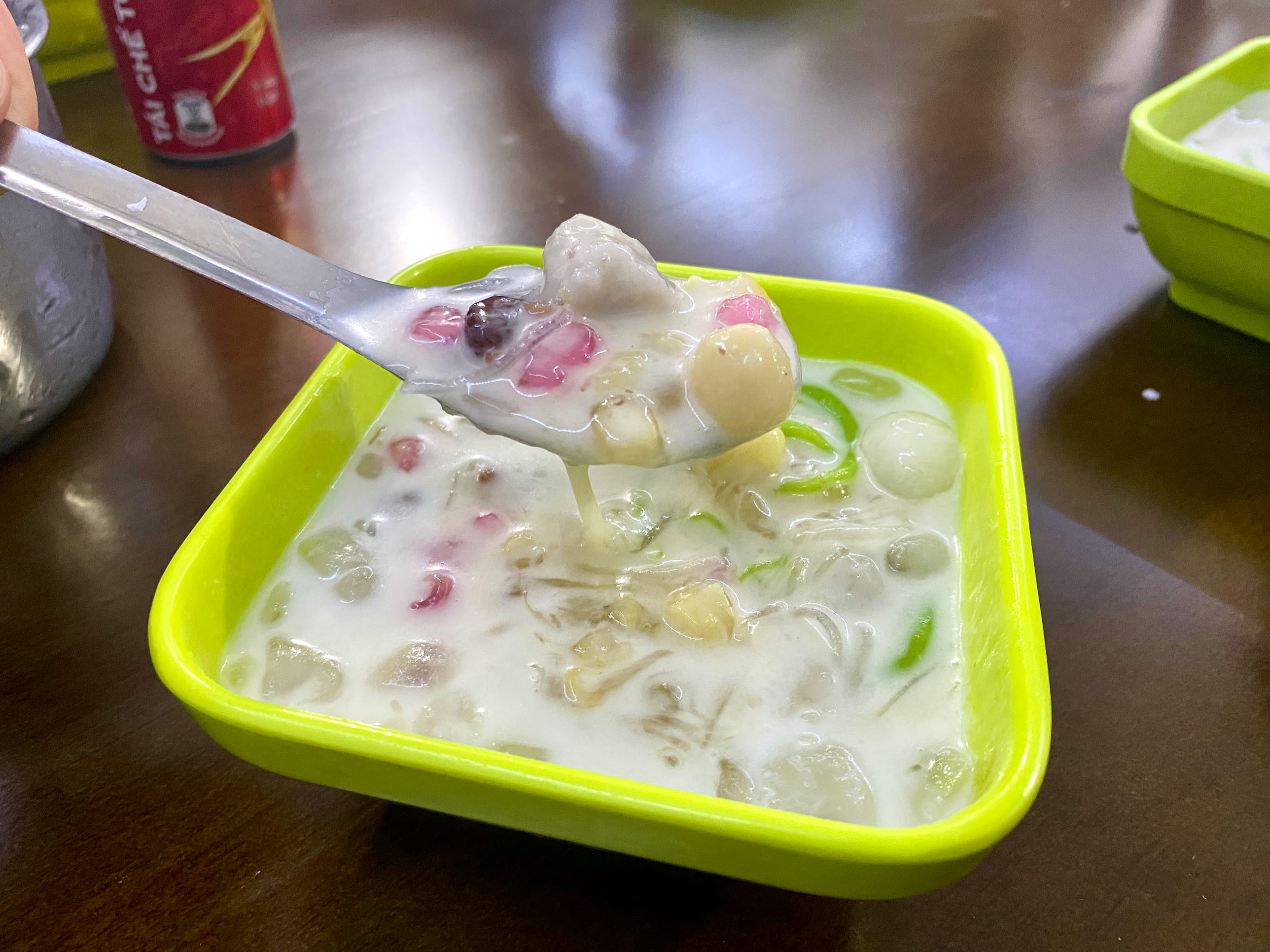
Chè. Wikipedia lists well over fifty kinds of Chè, and I’m not even going to try to guess which ones I ate. Refreshing and not too sweet.
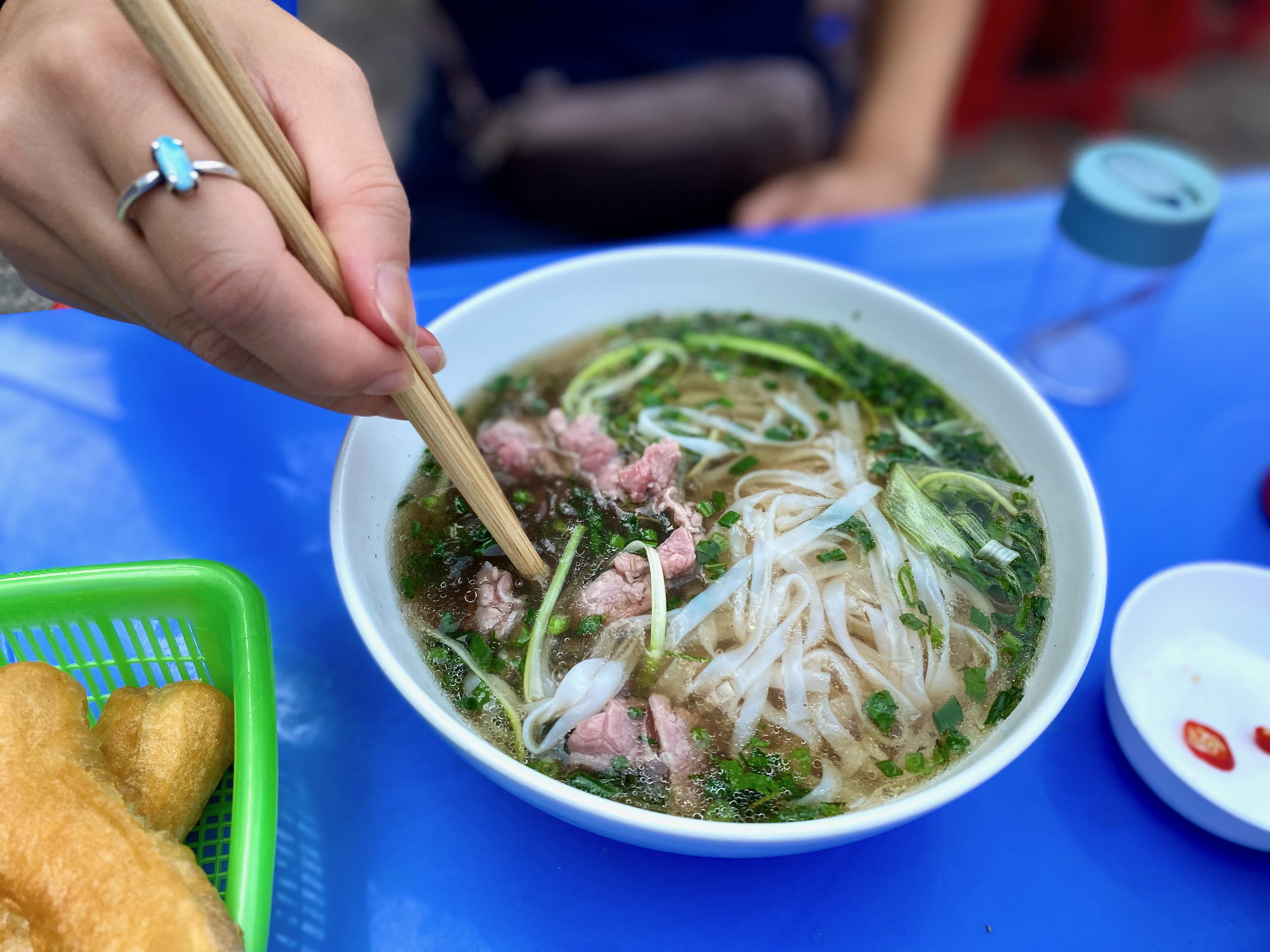
Pho. Breakfast food. Julie had this during the day or two where I couldn’t eat following some kind of food poisoning shenanigans.
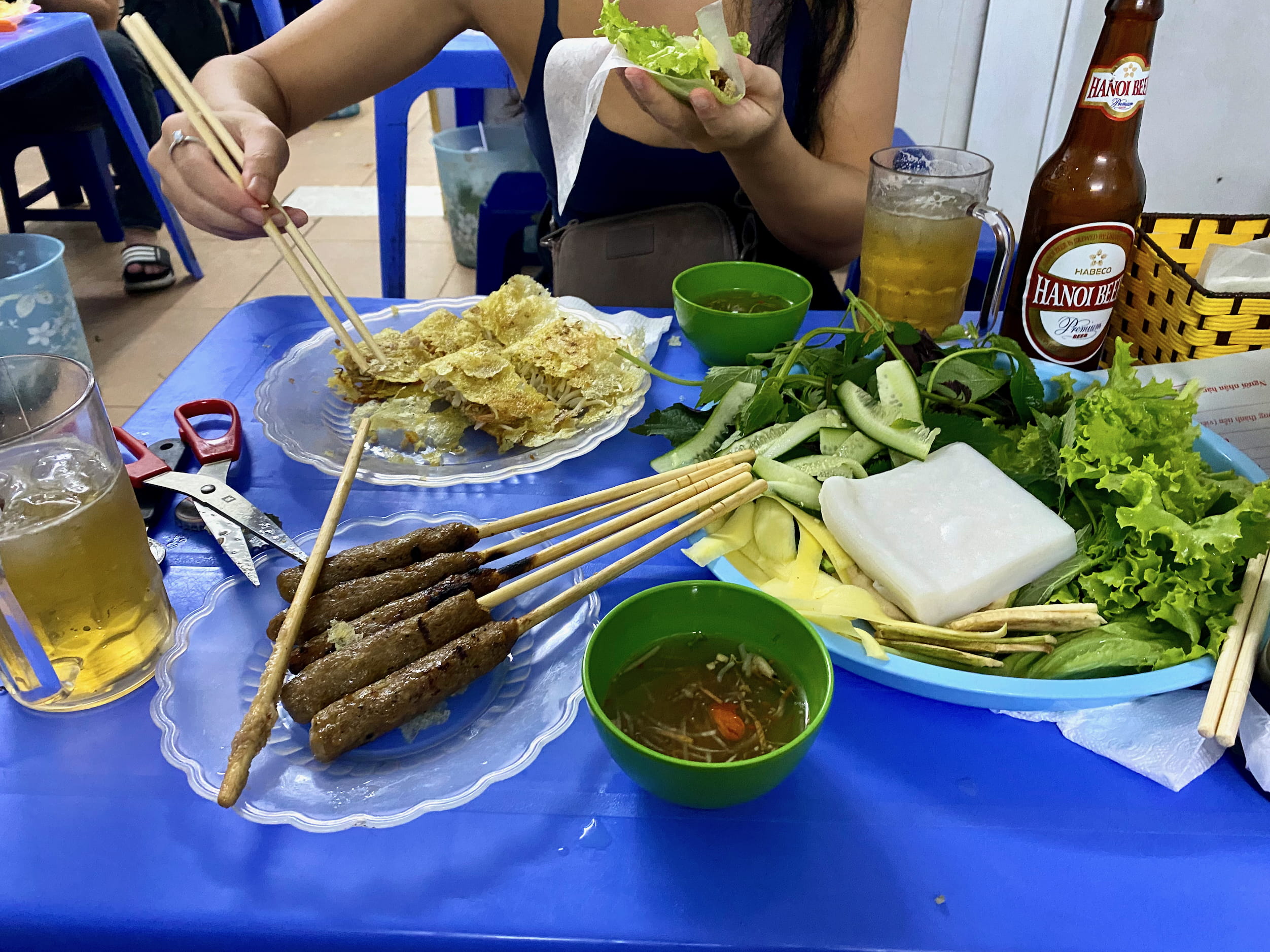
The most fun meal we had was bánh xèo, a DIY-construction task involving savory crispy pancakes, grilled meat, verbs & vegetables, rice paper, and dipping sauce. I was failing at it so badly that the woman running the show came over to our table, not once but twice, to wordlessly make one for me. Embarrassment was quickly overcome by stuffing the wonderful food into my face.
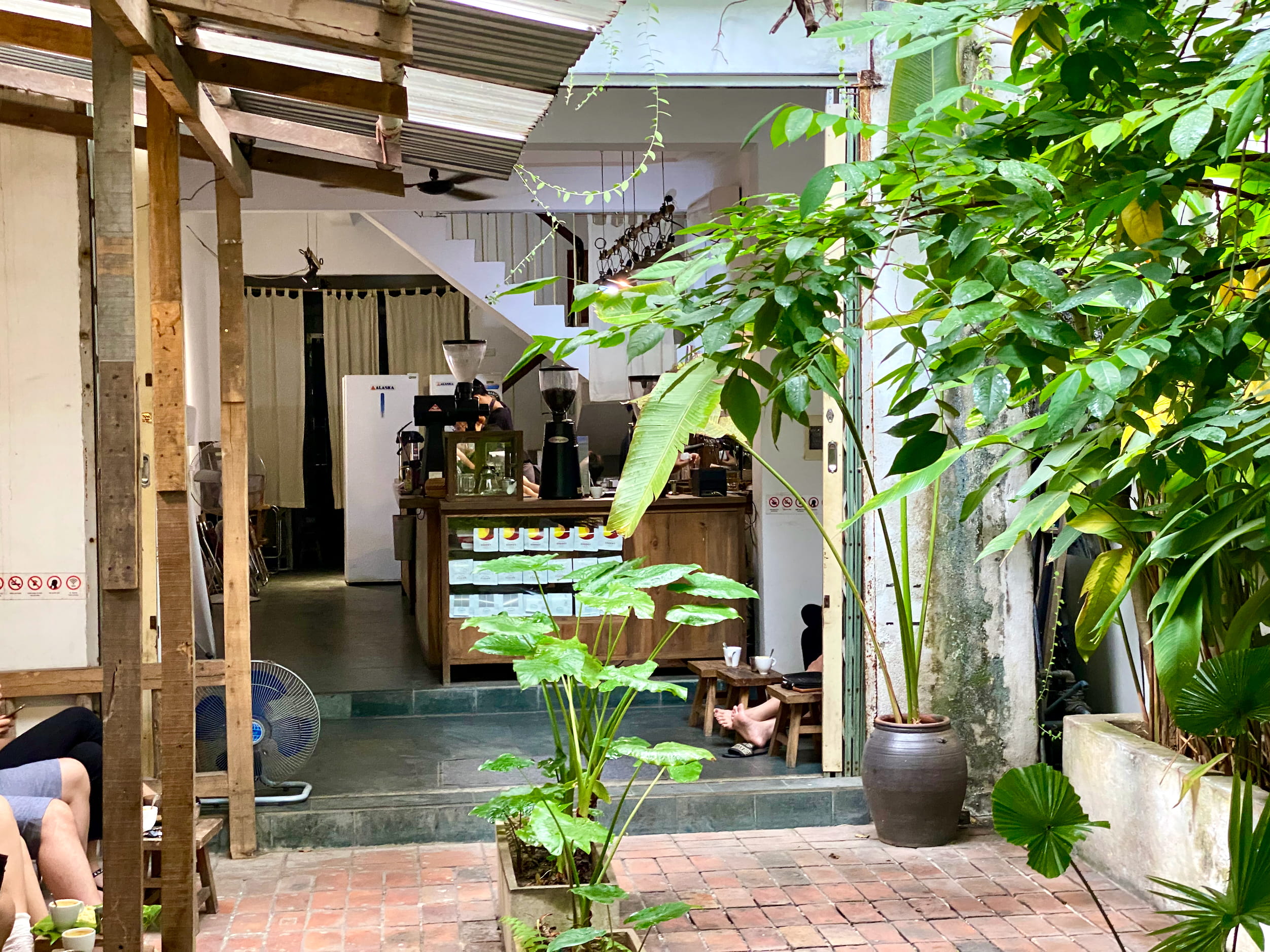
Hanoi, like much of Vietnam, had A+ coffee shop vibe game. The climate allowed generous outpourings of tropical plans that would embarrass any stateside third-wave joint. This is my bad attempt to capture the entrance to one of them.
With Mopeds, We Finally Understood Hanoi
The second good thing I’ll say about Hanoi is once you can get around by moped, it is awesome.
A negative way of putting this is that without a moped, it is nearly incomprehensible how you could live in the place. Walking down a single street was a battle. Because you’re walking in the street, and the street is madness. We spent the first couple days trying modest fifteen minute treks to try out food or coffee. By the time we’d get back, our nerves would be so shot we’d need to decompress. 05
But, praise be the Vietnam gods, there is an Uber knockoff called Grab that lets you summon a ride on the back of a moped. You call one, they show up in a couple minutes with a spare helmet. You jump on, and they blast off and take you anywhere in the city for, I kid you not, $1.
Julie with a clean dismount back at the hotel.
The first time we rode one, I could barely stop myself from laughing with joy the whole ride. Everyone driving by us must have thought I was nuts with the size of my smile. Because it totally transformed the city. In an instant, I got Hanoi. By moped, the terrifying streets become a river you can ride in. No matter how many hundreds of bikes there were, it never seemed to cause actual traffic, so you could get where you needed quickly. And having it cost so little meant we could go wherever, whenever, without thinking about it.
In our couple weeks in Vietnam, we took somewhere between 40 to 60 moped rides with Grab, most of them in Hanoi.
Grab isn’t without its hiccups. It would randomly and frequently refuse to take our credit cards, so we paid for most rides in cash. The drivers would, at least half the time, inexplicably stop one or two blocks away and call us on the phone, leading to an extra coordination dance where I’d have to convince them I couldn’t speak Vietnamese and to please just drive to the spot on the map, I am indeed there, I’m sorry, please, thank you. And after a few rides, I started to realize that my helmet usually didn’t fit very well and wasn’t especially generous in the padding department.
But those are peanuts to the complete transformation that being on a moped did for being in Hanoi. While I still never felt like I could escape the noise and pollution like I could in Saigon, mopeds totally opened up the city.06
Pollution
The kicker. The air and water and streets and parks are all miserable. It’s heartbreaking.
Head to any waterway, for example, and look at the shore. On the edge will be dead fish floating alongside trash.
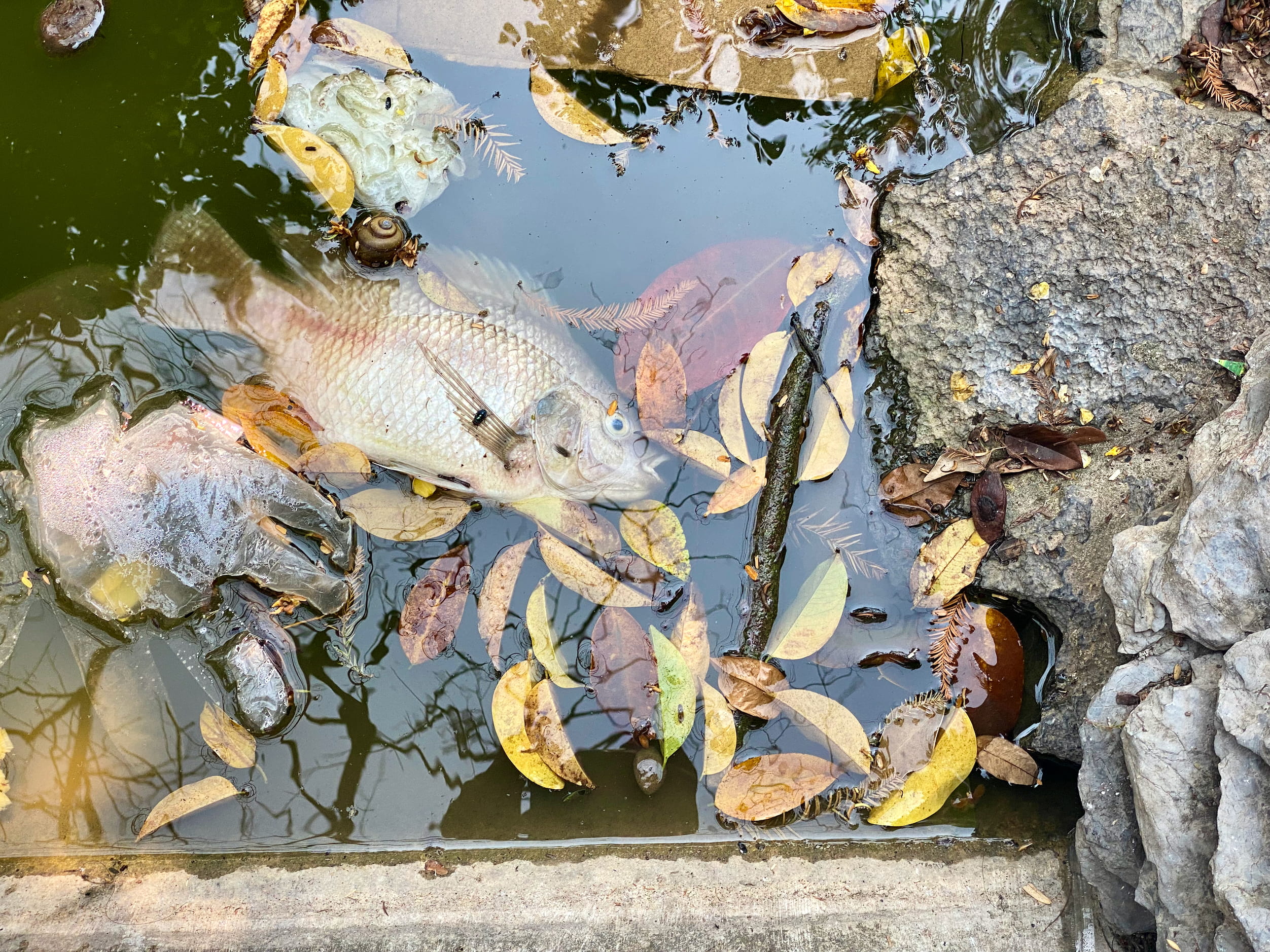
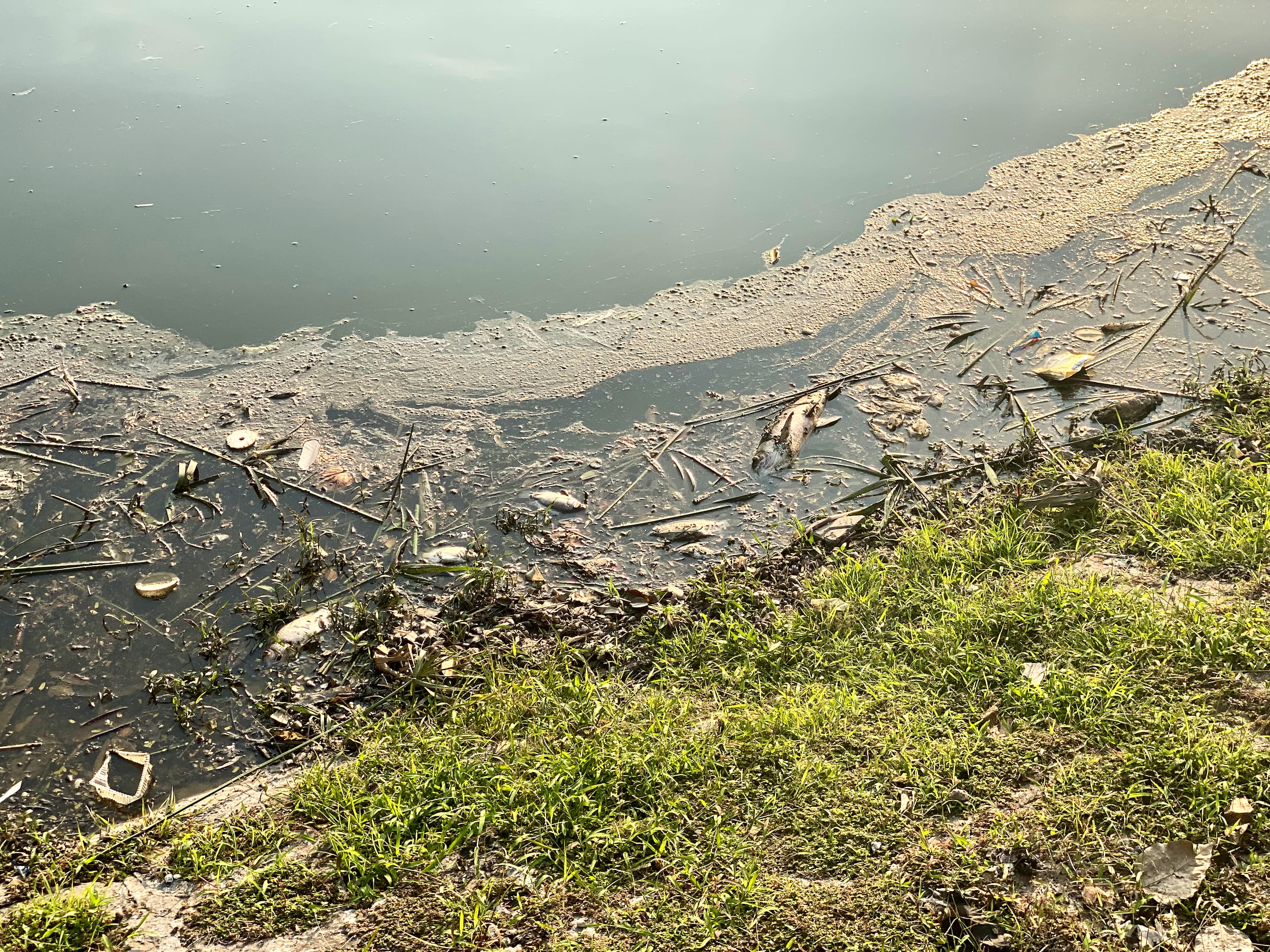
Just a few steps away from where I took the cover image at the top of this post—beautiful building above tropical foliage reflecting in water—is a sign fruitlessly telling people not to do what they’ve already done.
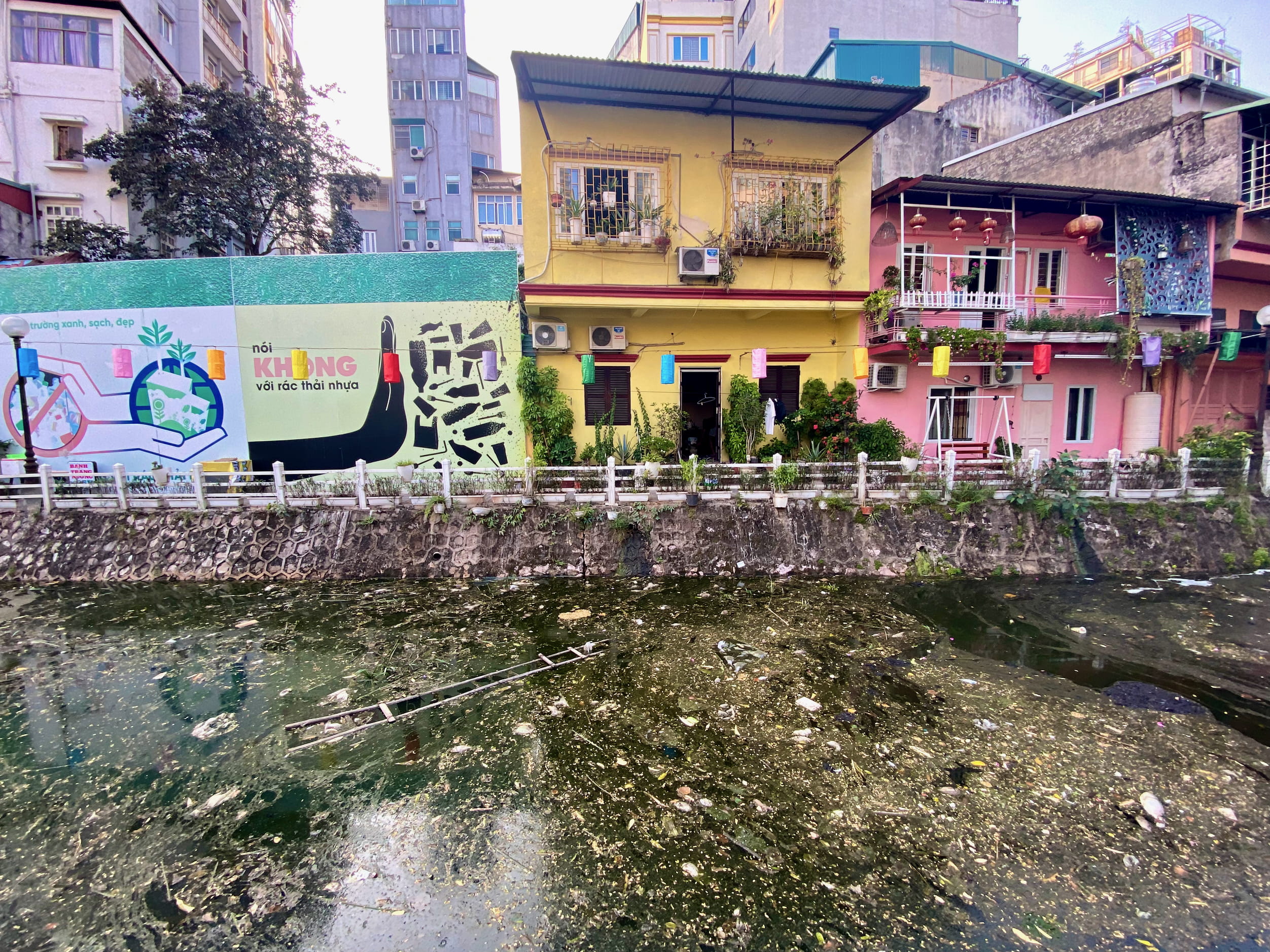
The lack of clean air gave kind of suffocating feeling, mostly metaphorically. Ordinarily, while in a big city, visiting parks is a source of respite when the concrete has gotten to be too much. But even parks in Hanoi were polluted to the point that they didn’t give the mind a break from the urban sprawl, only made it more hopeless somehow.
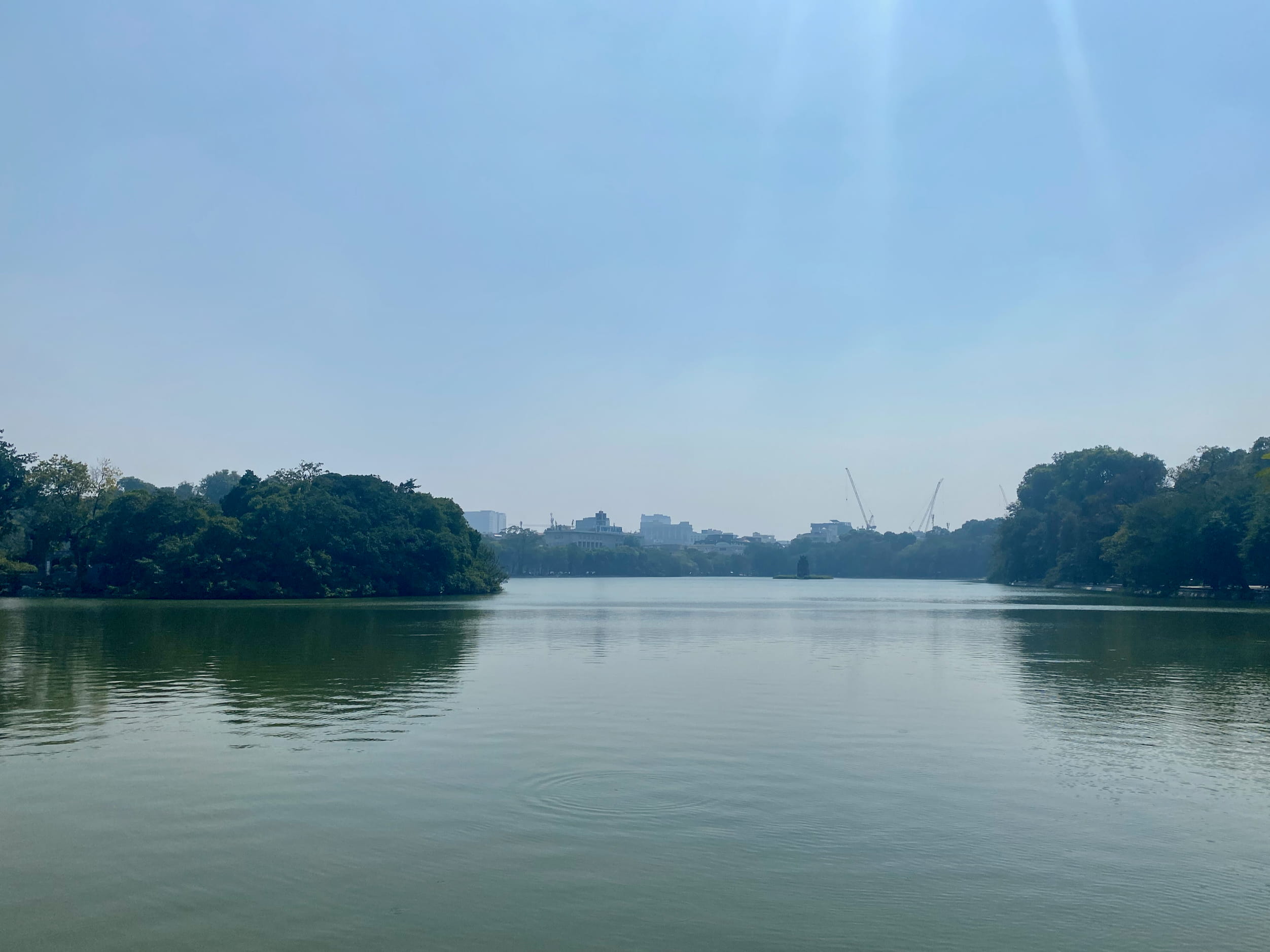
A bit hard to convey by photo. I distinctly remember leaving the airport the first night we arrived, and the air smelled and even tasted like Washington air does in heavy forest fire season.
This really came to a head one morning when we were out and about, killing time between 5:30am and 3pm. We’d arrived from the overnight train back from Sapa, but couldn’t check into our hotel room yet. This meant no good access to a bathroom either. After visiting a park07 we sat down for some breakfast bun cha, when waves of nausea like I’d never felt washed over me. The next few hours are a blur of suffering: needing to sit, trying to find places to sit, constantly scoping out where I could puke, needing to walk, trying to find a restroom, never being able to escape gasoline or trash or composting dead fish water.
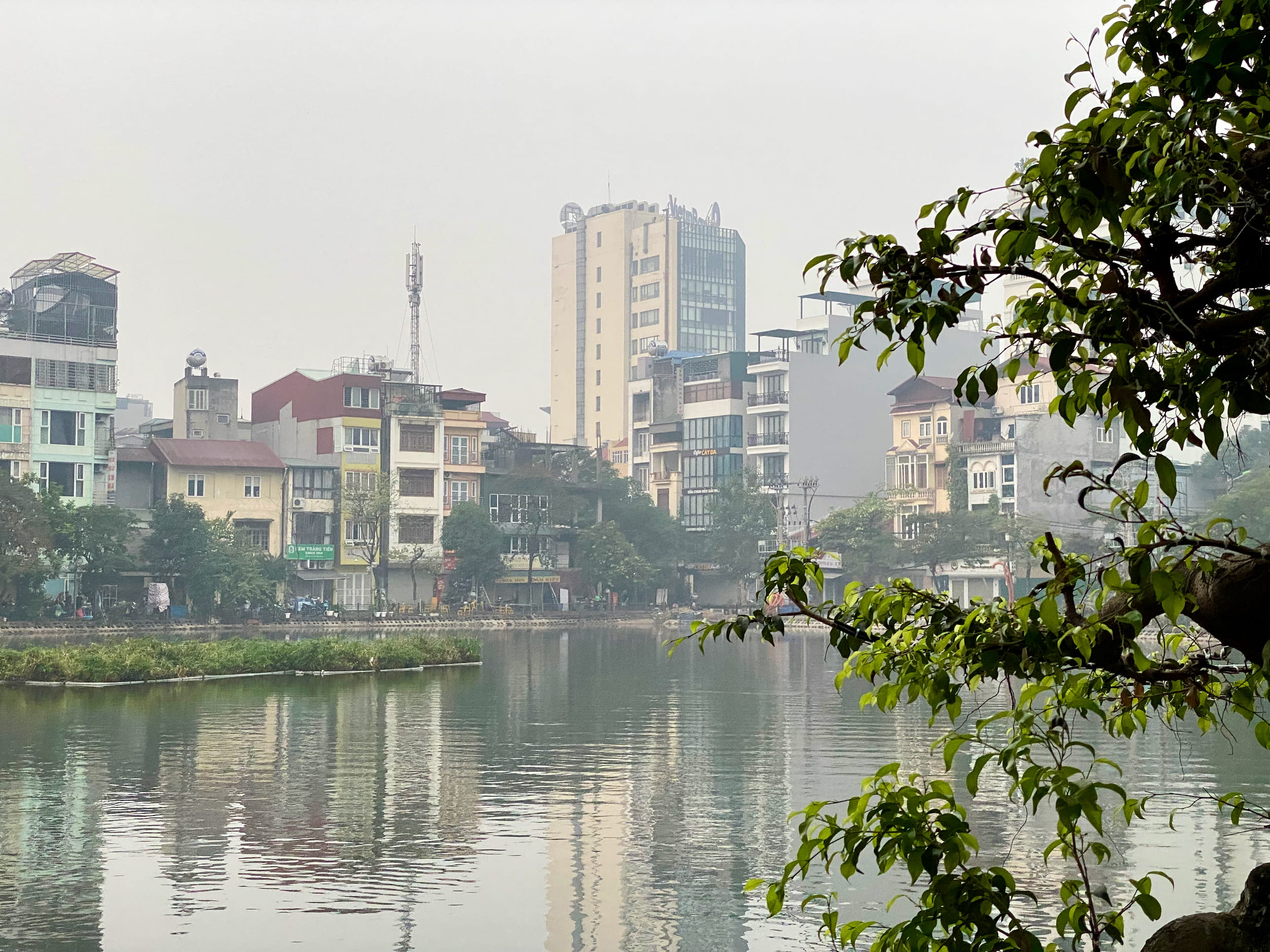
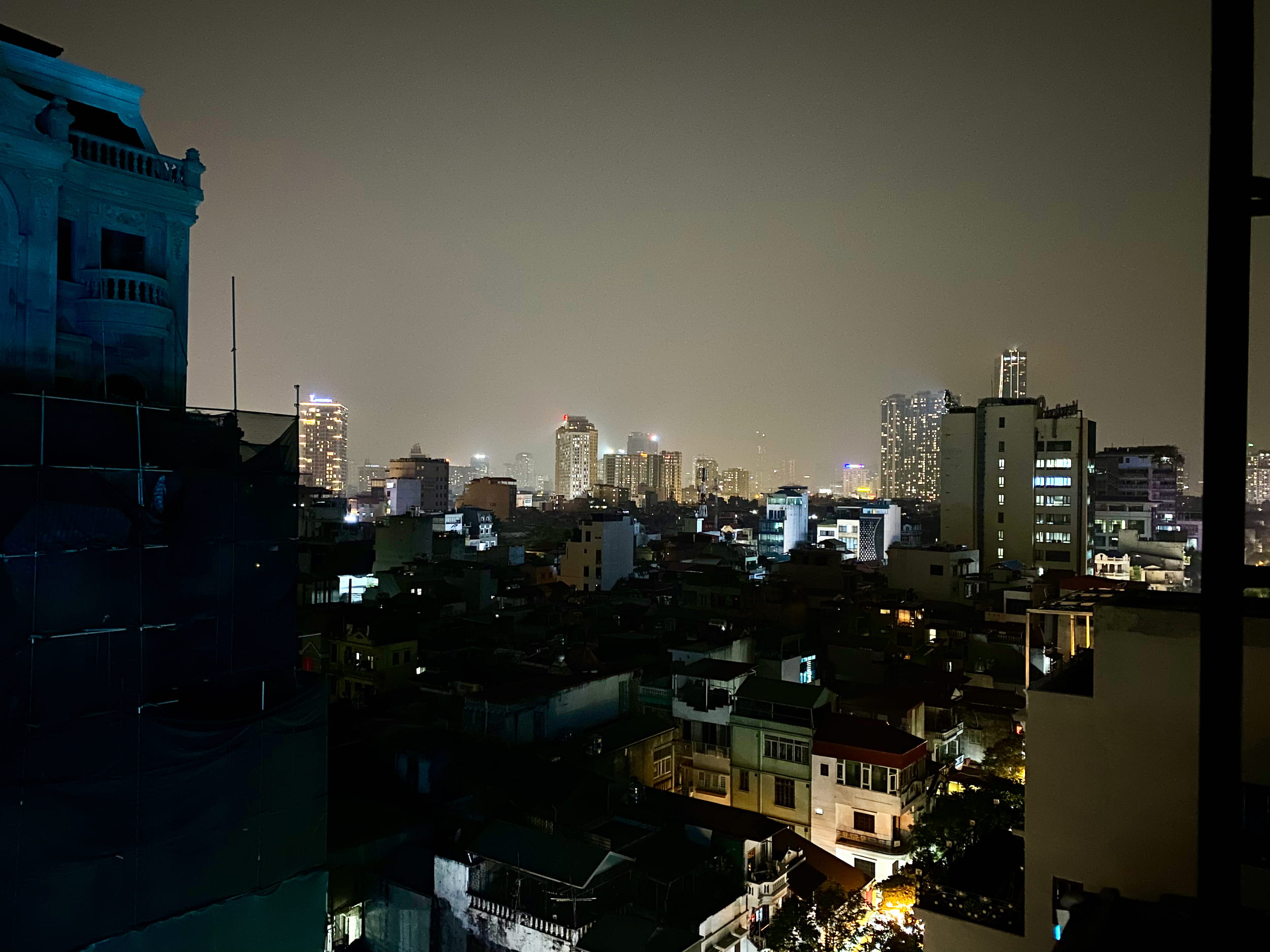
I eventually started thinking of the city as Smognoi.
It’s a shame. It sucks. For all Hanoi’s incredible food, vibrant streets, and moped mobility, I think pollution made it somewhere I’d have a hard time ever spending more than a couple weeks. I have no idea what forces are at play here, and I imagine there’s a good chance the West is partially responsible—outsourced manufacturing or the like. But regardless of the reason, it is what it is. I hope they manage to improve it.
Ninh Binh
As I mentioned in my blog post Sleeper Train to Sapa, there are three principal OMTAs from Hanoi which are each usually done as one to three-day trips:
- Sapa (next post)
- Ninh Binh (this section)
- Halong Bay (see next section)
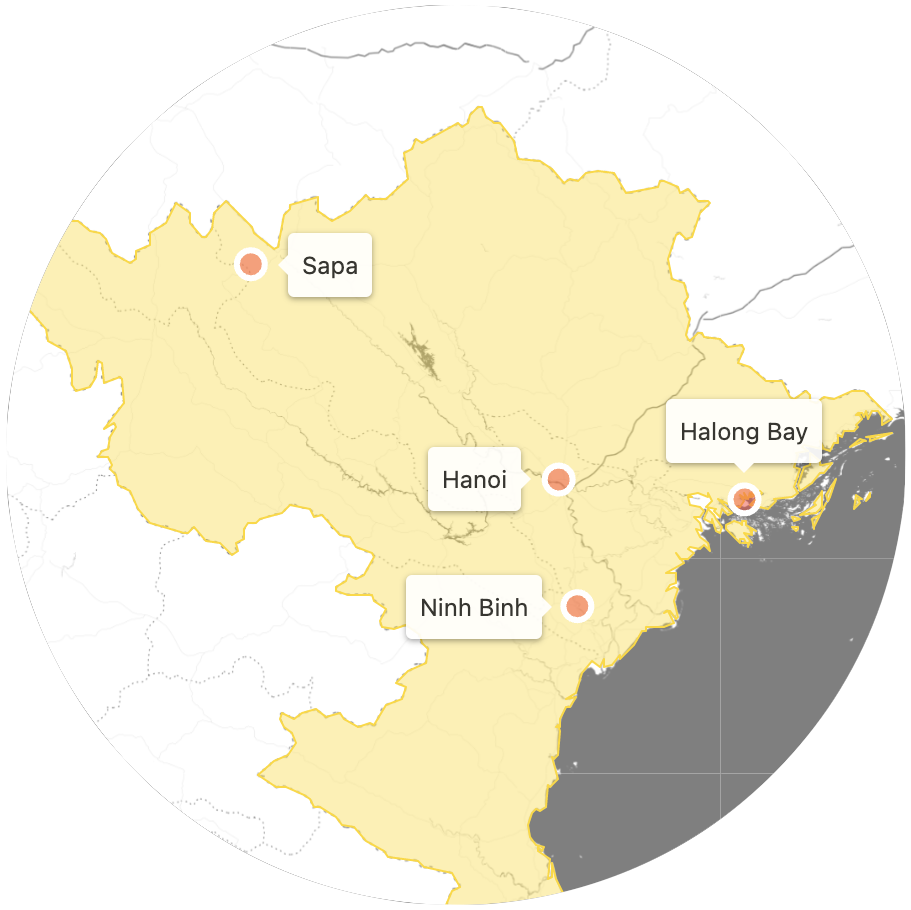
Locations of Hanoi-region OMTAs.
The structure of OMTAs in Vietnam follows a formula that should be familiar to Southeast Asia travelers.08 And if you don’t know it, you will quickly be brought up to speed to the handy eight-step formula.
-
Agonize over countless identical options for the tour on online booking sights.
-
Reviews will assure you that your choice matters and that their tour guide, Alex, was fun and interesting and made the trip special. Rest assured, your choice does not matter.
-
All choices will have lunch and all tickets included. This is to trick you to think that $30 or $50 or—god help you–$100 is remotely related to the cost of the goods you are about to be provided.
-
-
Board bus.
-
Make a pit stop at a “local market for local craftspeople to sell their local wares.”
The local market actually turns out to be the size of a 747 hangar, has seventeen tour busses already parked outside of it, sells everything on the planet including fake Gucci bags, and is an absolute fucking zoo of tourists.
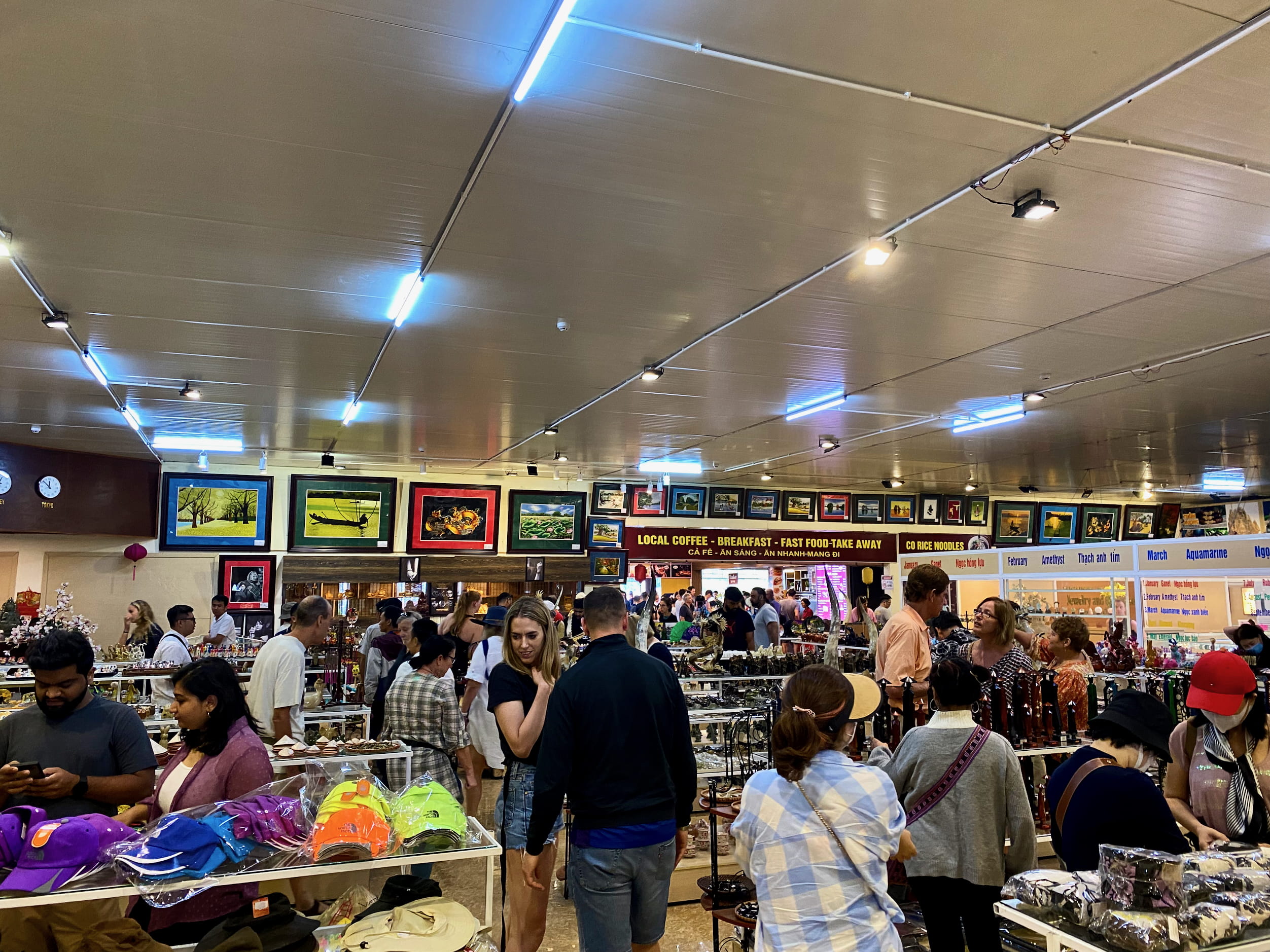
Get out get out get out get out
-
Perform laundry list of OMTA-adjacent activities.
- These were created to lengthen the bullet list of tour-provided features.09
For the Ninh Binh exursion, this involves looking at, e.g., nicely constructed towers of Bia Hà Nôi (Hanoi Beer) and canned corn as offerings at a temple that nobody but tourists have visited for twenty years.
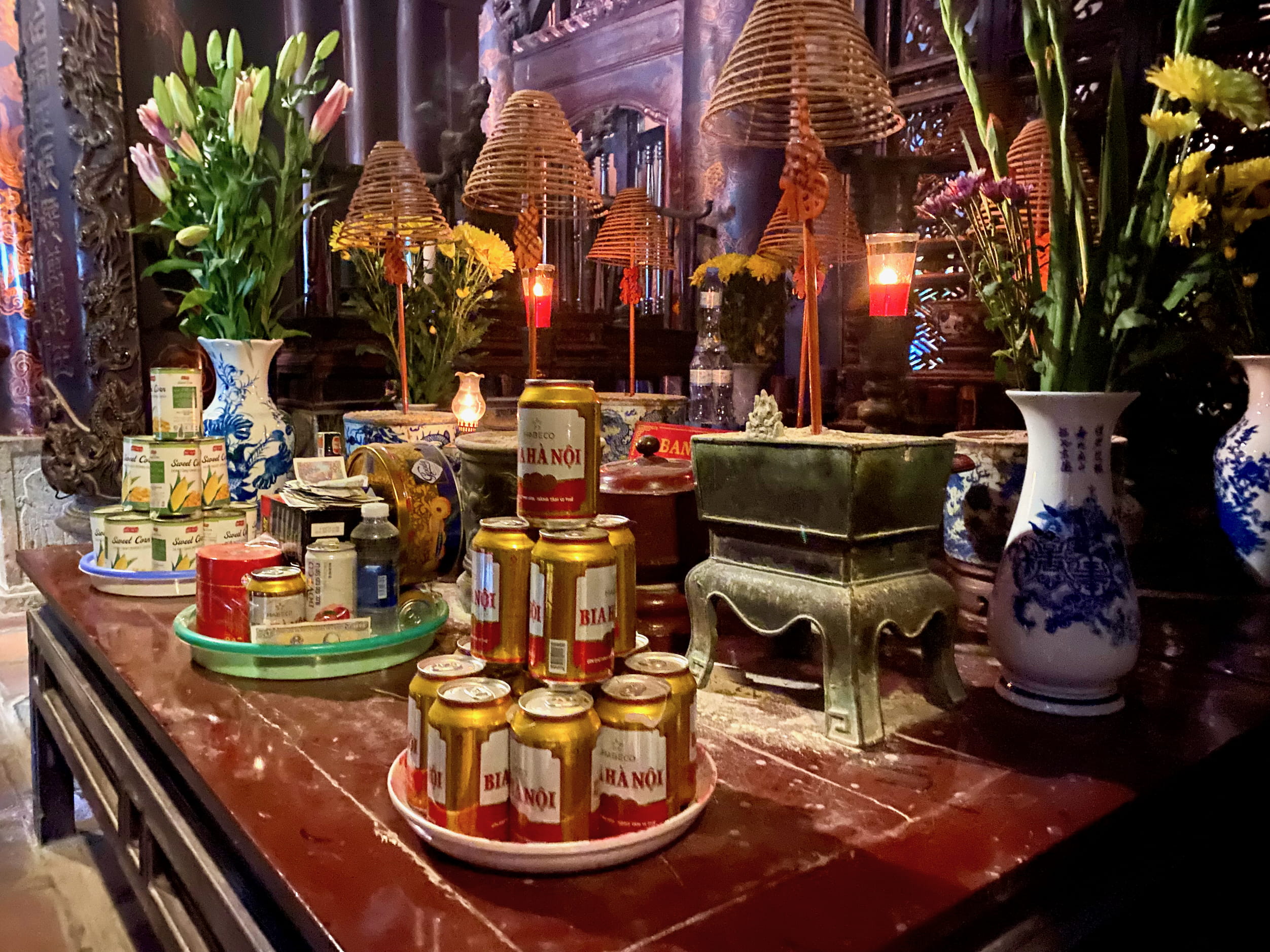
And hanging around this parking lot for a while, I guess.
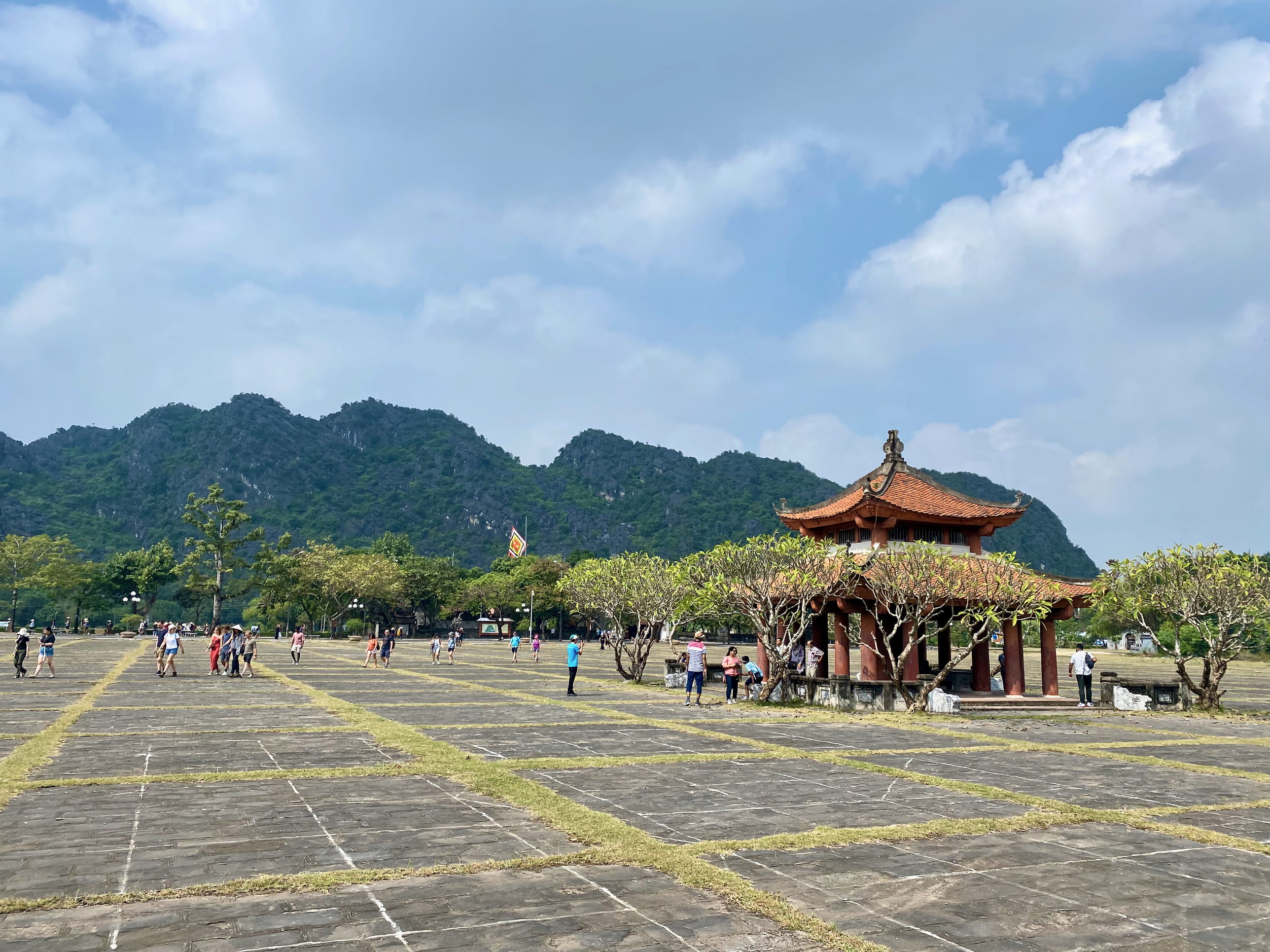
-
Lunch (included)
In uncanny similarity to #3, your local lunch spot will be a whitewash room that comfortably seats about four hundred. Parked in the lot next to you will be an oddly familiar seventeen other tour busses.
Grub will be buffet style, or three simple options. For our outing, the best food was the peanuts.10
Make small talk with bus seat neighbors you have been avoiding talking to, who have been probably gossiping about you in their native European language they carefully confirmed nobody else on the bus understands during the tour guide’s obligatory where’s everybody from? roll call at the start of the day. Now your laboriously organized travel plans will become perfect fodder to last an otherwise very long thirty minutes. For Vietnam, the universal opener is: are you going north→south, or south→north? Then compare notes about OMTAs.11 Also, legitimate good opportunity here to pick up tips about what to do or skip from honest fellow travelers. Might be a small town in Laos or a boat trip in El Nido.12
-
Thing you actually signed up on the damn tour to look at.
Ninh Binh is famous for limestone hills, which you can check out by bicycle or rowboat or both. Some13 call it Halong Bay on land. Because Halong Bay also has limestone hills.
Here’s Part I on bicycle.14
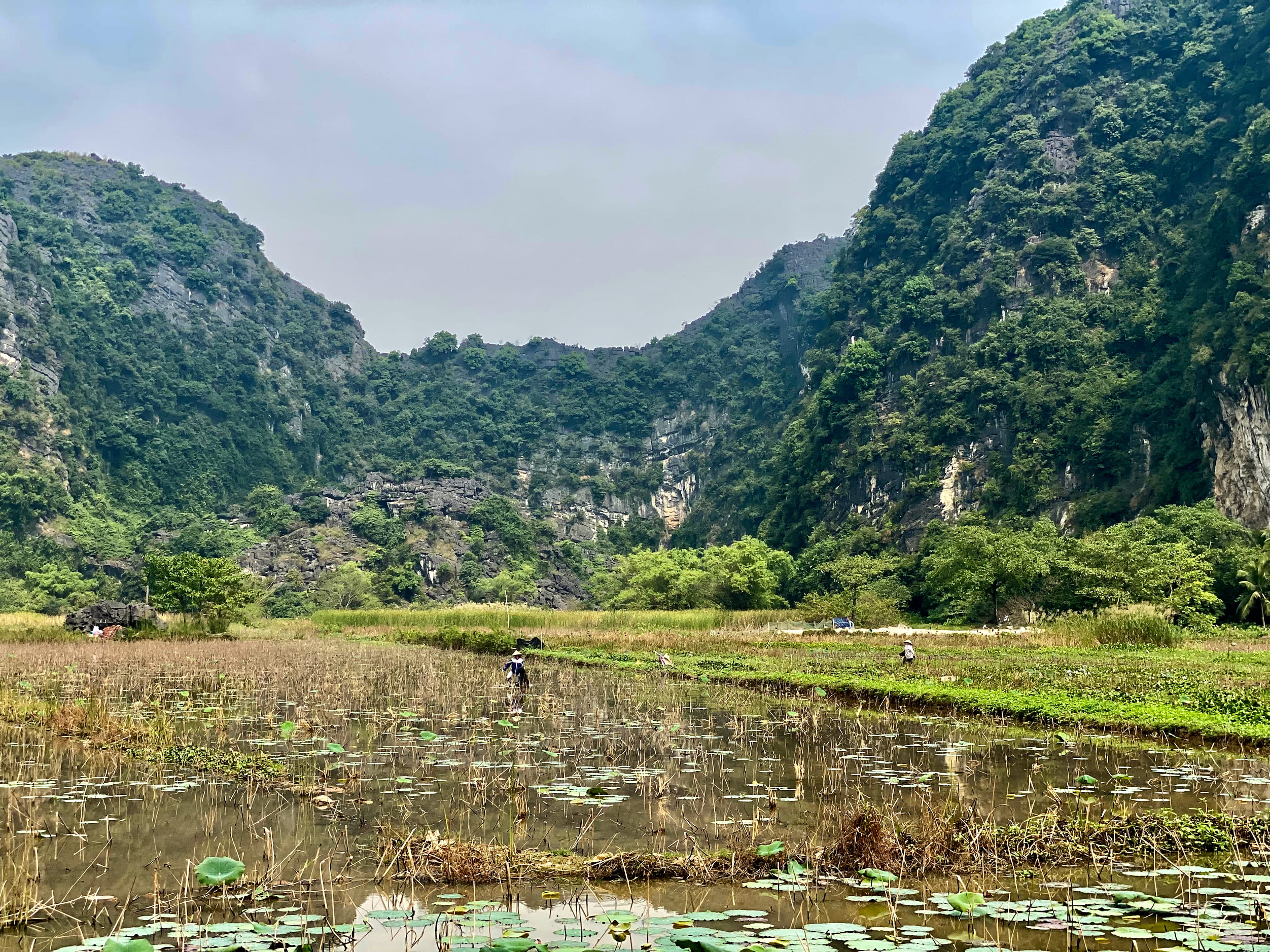
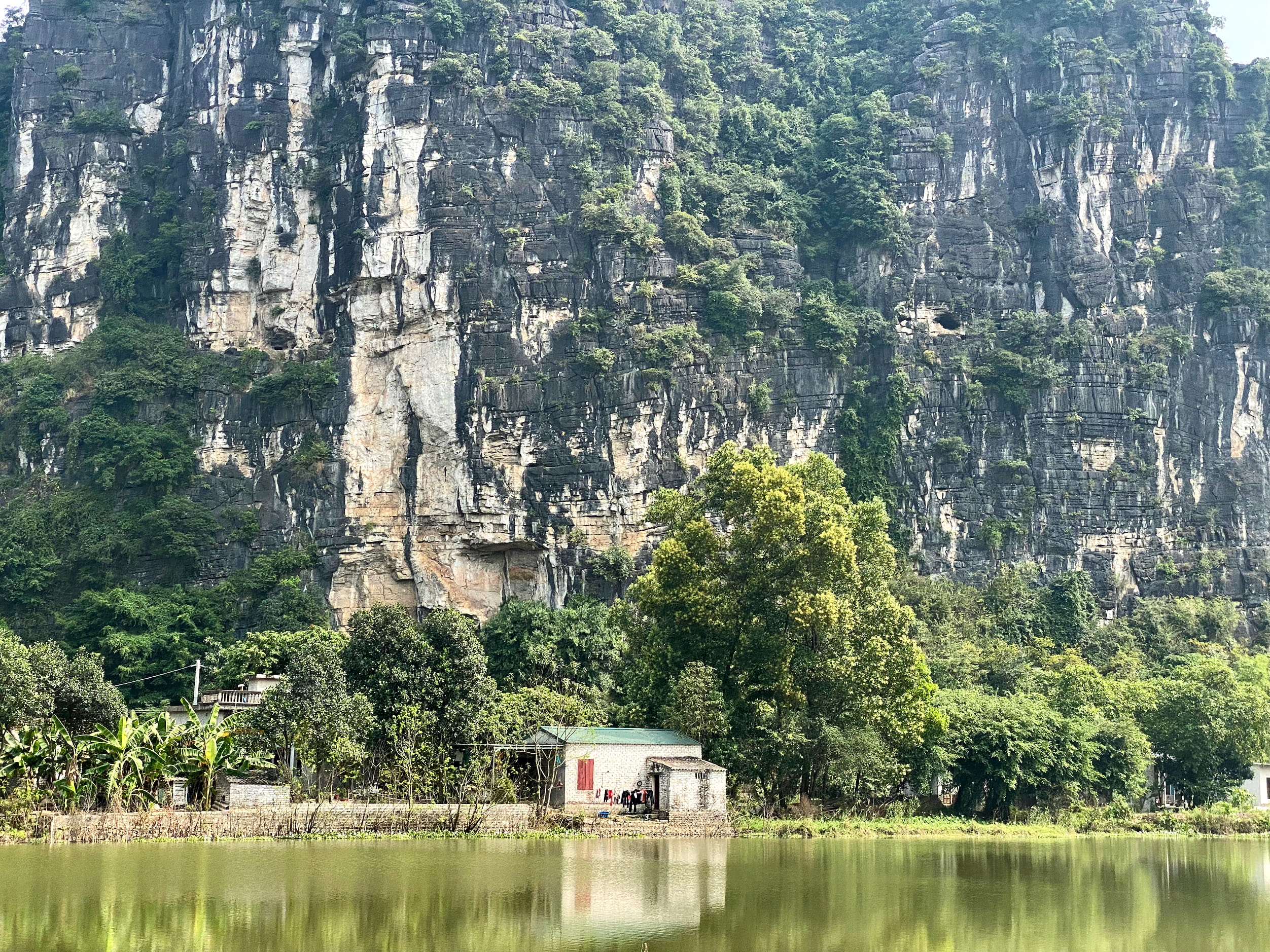
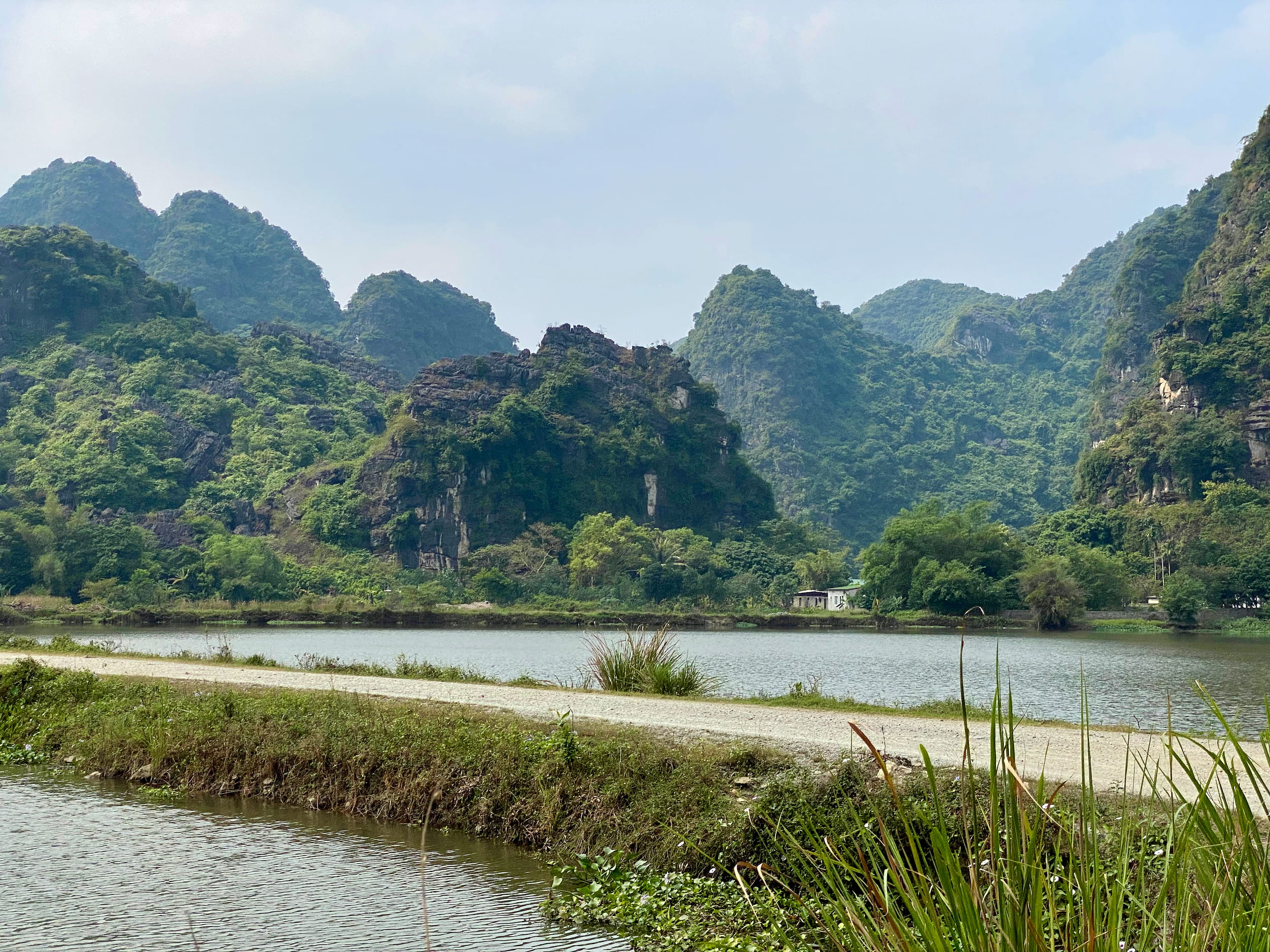
Julie only re-learned to bike this year (yes, the saying is wrong, you really can forget) so give her a break.
Next, Part II of main activity. For Ninh Binh, this was by boat.15 The rowers were, to my ceaseless amazement through the whole ride, rowing with their feet.
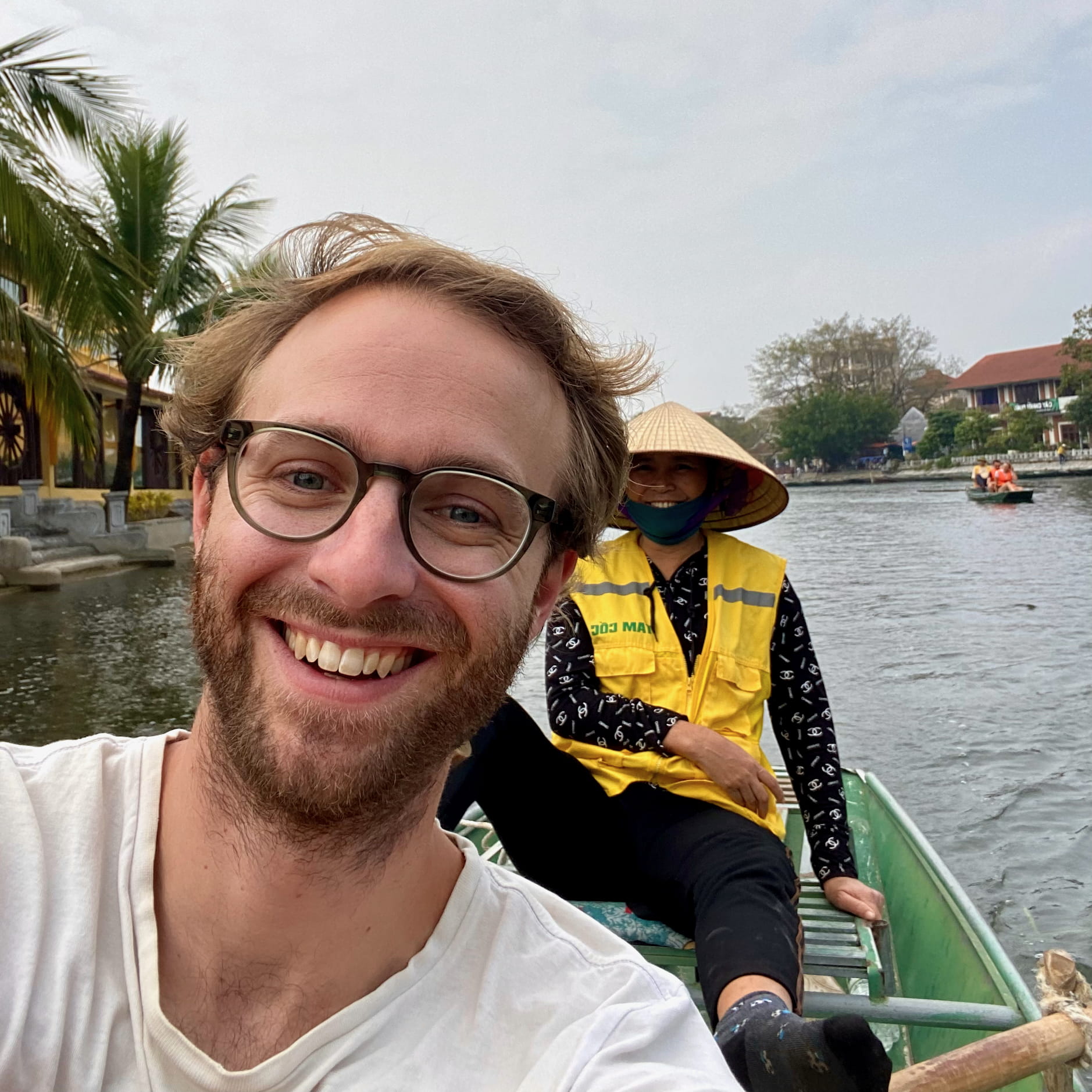
Also, me
-
Interject well-known scams that still work on almost everyone.
Somewhat Vietnam-specific: you need to read up on every activity to learn what scams happen, and which you can avoid and how. This is one of the big benefits of having a guide: they can tell you what to expect and what to do. At the Ninh Binh boat segment, for example, there are two main scams:
-
(a) At the rowing turnaround point, a hoard of snack-selling boats idle. Your rower brings your boat right up to them. Whether or not you buy any for yourself, they will ask if you want to buy any for your rower, the poor soul who has expertly paddled you all the way there. If you accept, they will quickly pick out a large assortment of well-over-market-rate goods from their friends on the other boat, and then not open them.16 This can be avoided entirely, though you will have to say no half a dozen times.
-
(b) The rower will always want to double the tip you give them. We found out an appropriate tip from the guide beforehand. At the end, like clockwork, our rower changed from smiling and laughing to dead serious insistence we hadn’t paid them enough. (This would be the first time we’d see this uncanny transformation happen, but it wouldn’t be the last.) I didn’t think they were going to let us off the boat.
-
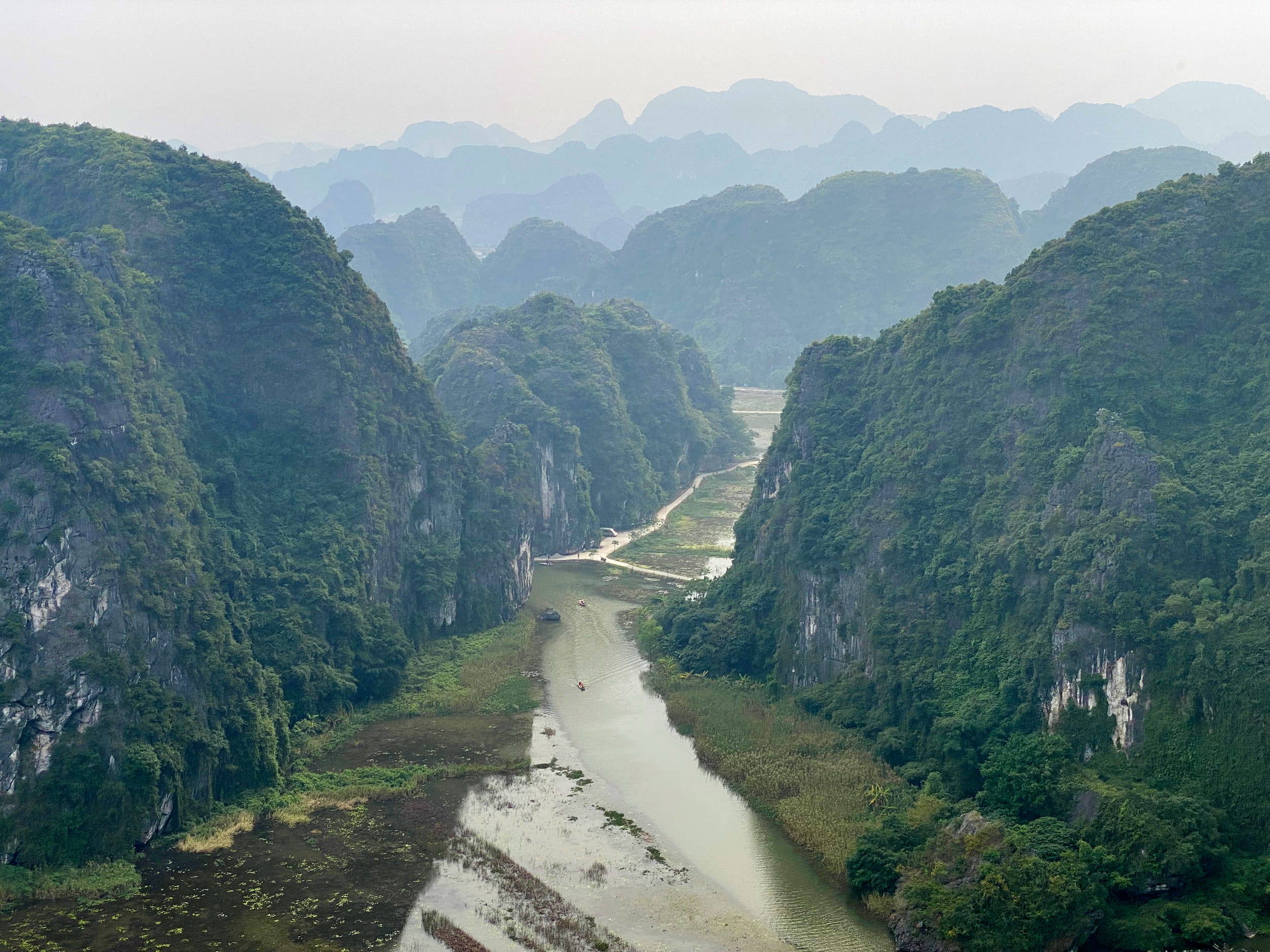
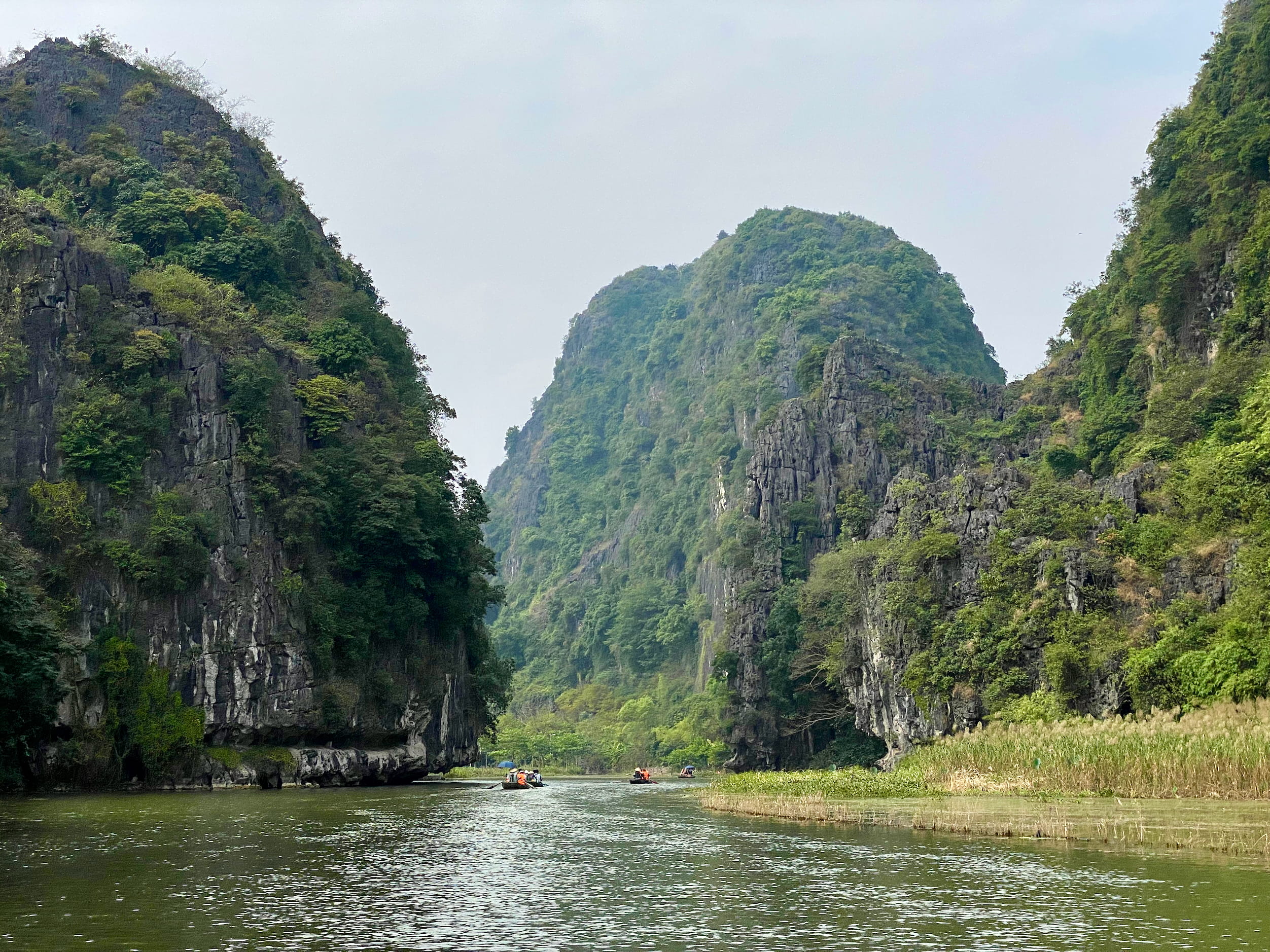
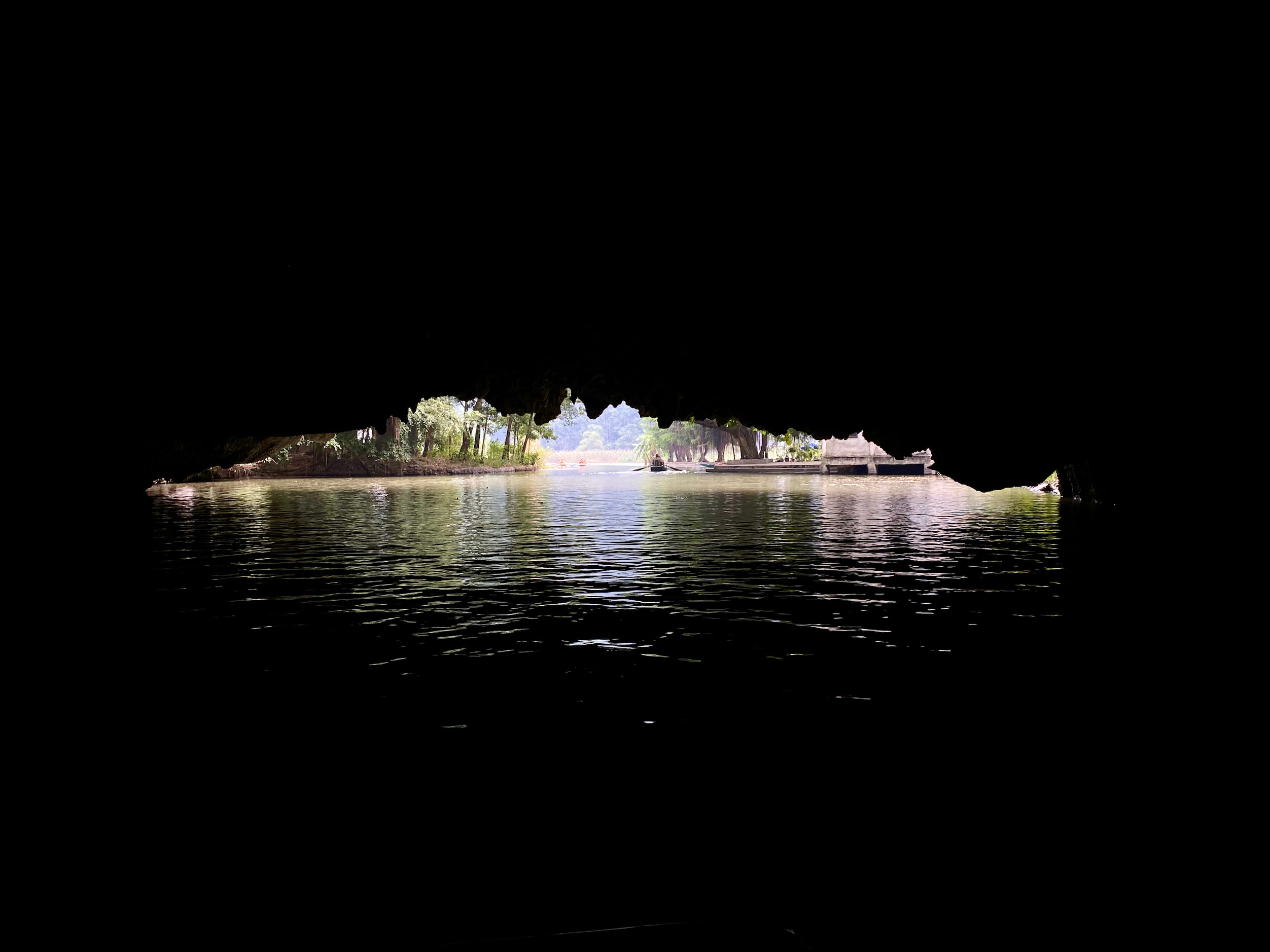
-
Final stop that actually exceeds expectations.
For Ninh Binh, short hike atop a rock to look at other rocks fading into the distance.
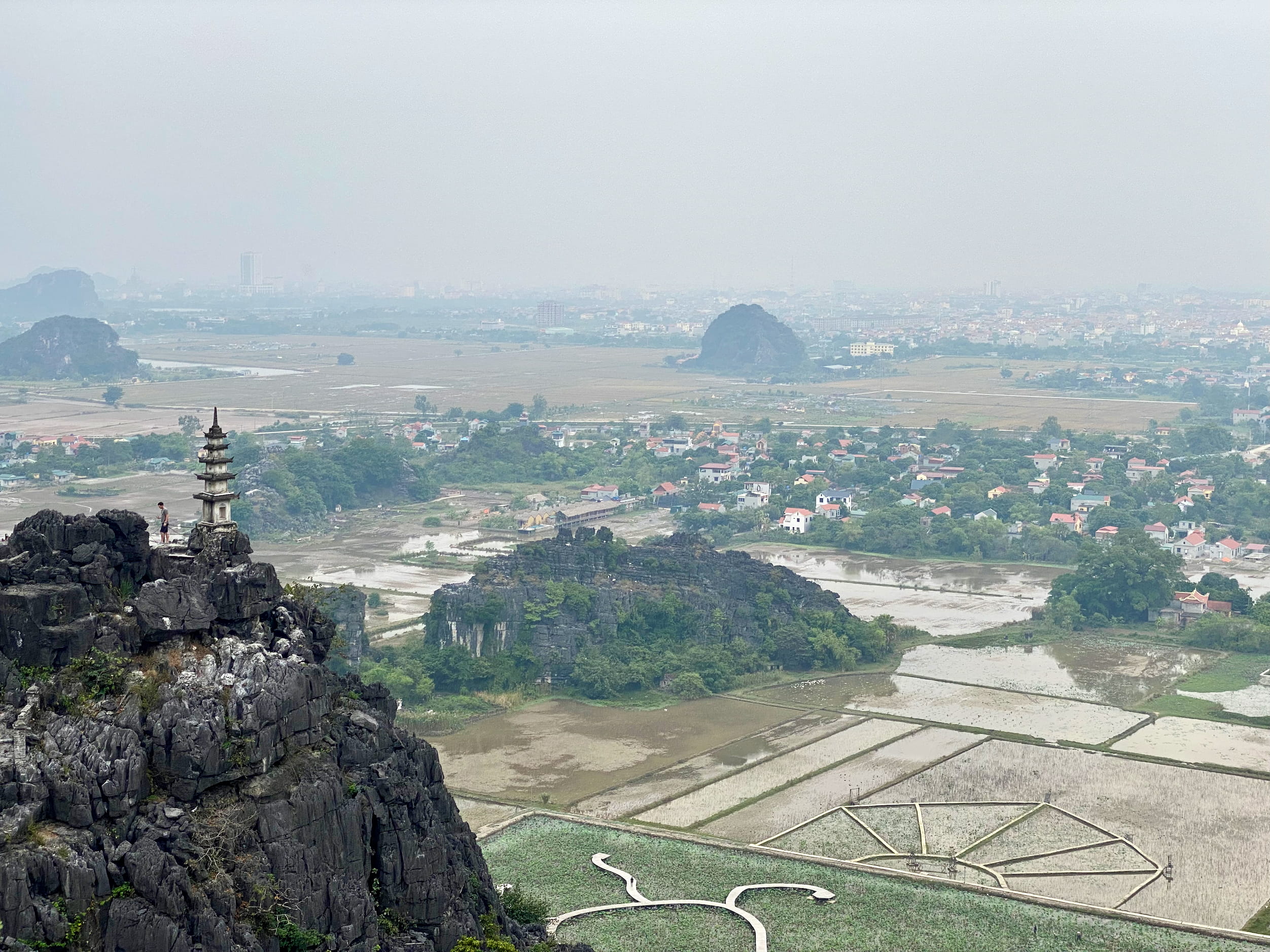
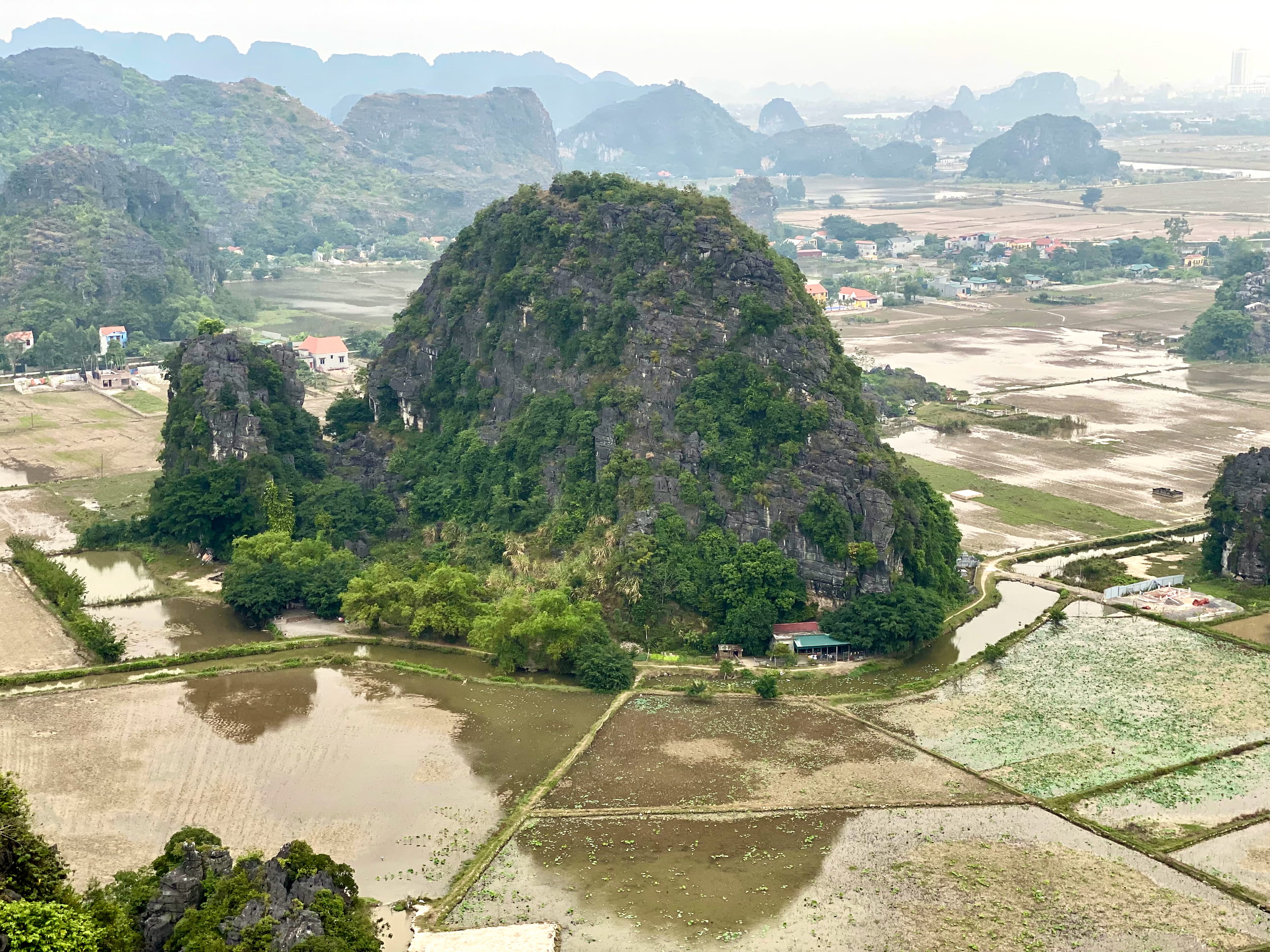
And these horses.
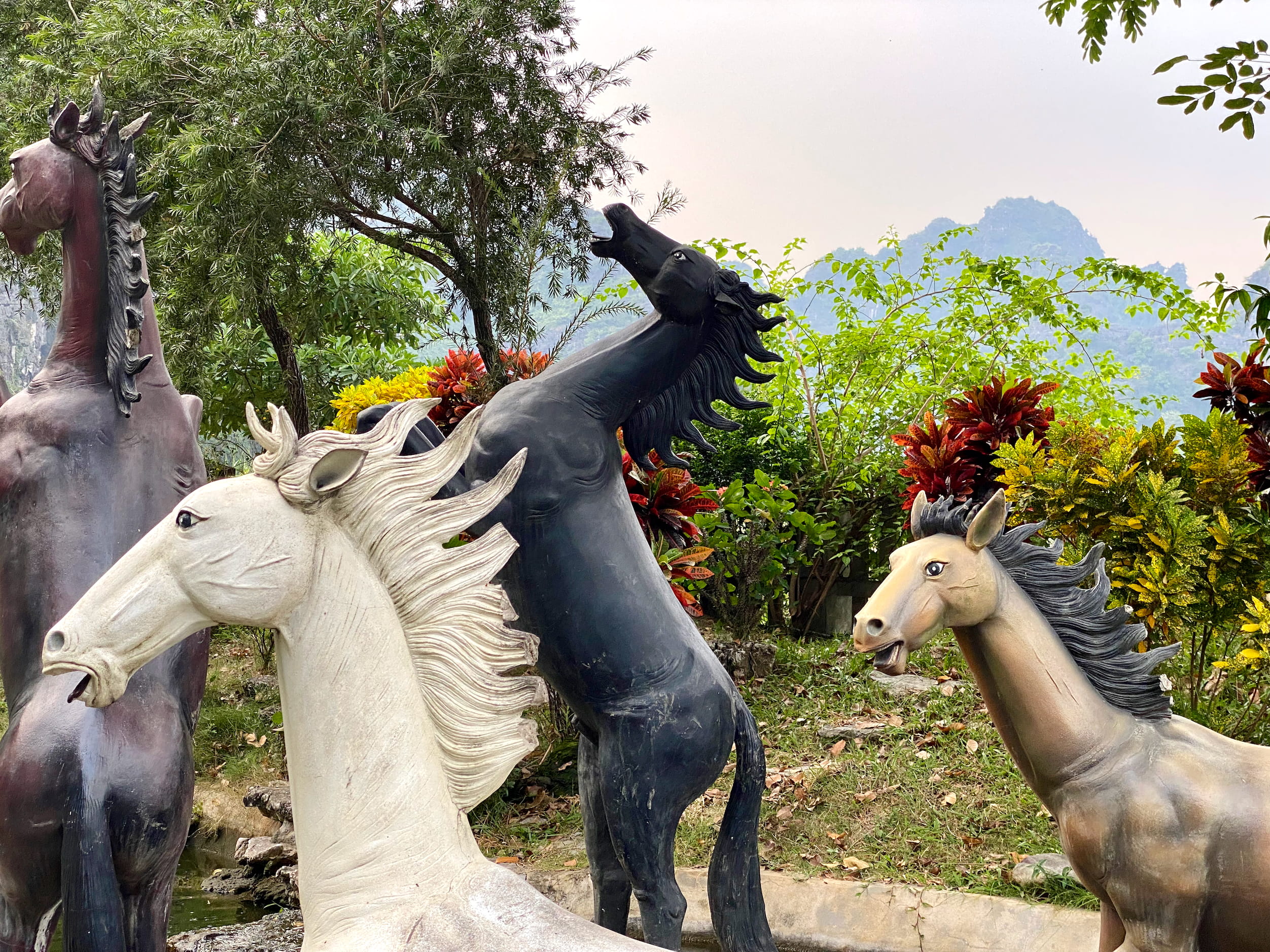
These remind me a little bit of the rocking horse in the attic of Gahan Wilson’s The Ultimate Haunted House, which—only sometimes—springs to life when you try to leave and puts on a mean face and demands an item or something. I wish I was joking when I say that it was the single scariest thing of my entire childhood.
Triumphing Over FOMO and Skipping Halong Bay
Halong Bay = famous limestone hill water cruise zone.
On paper, we had every reason to skip Halong Bay: we were tired of the OMTA tour script;17 it’d be similar to what we’d already seen;18 and it was crowded,19 long, and expensive.
Even will all that, it was still a difficult decision not go to. FOMO while traveling is strong. The hardest decision you can make is to not do something.
I am extremely proud to announce, here, to you, in public, for the first time ever, that we didn’t go.
Spotted at the Climbing Gym
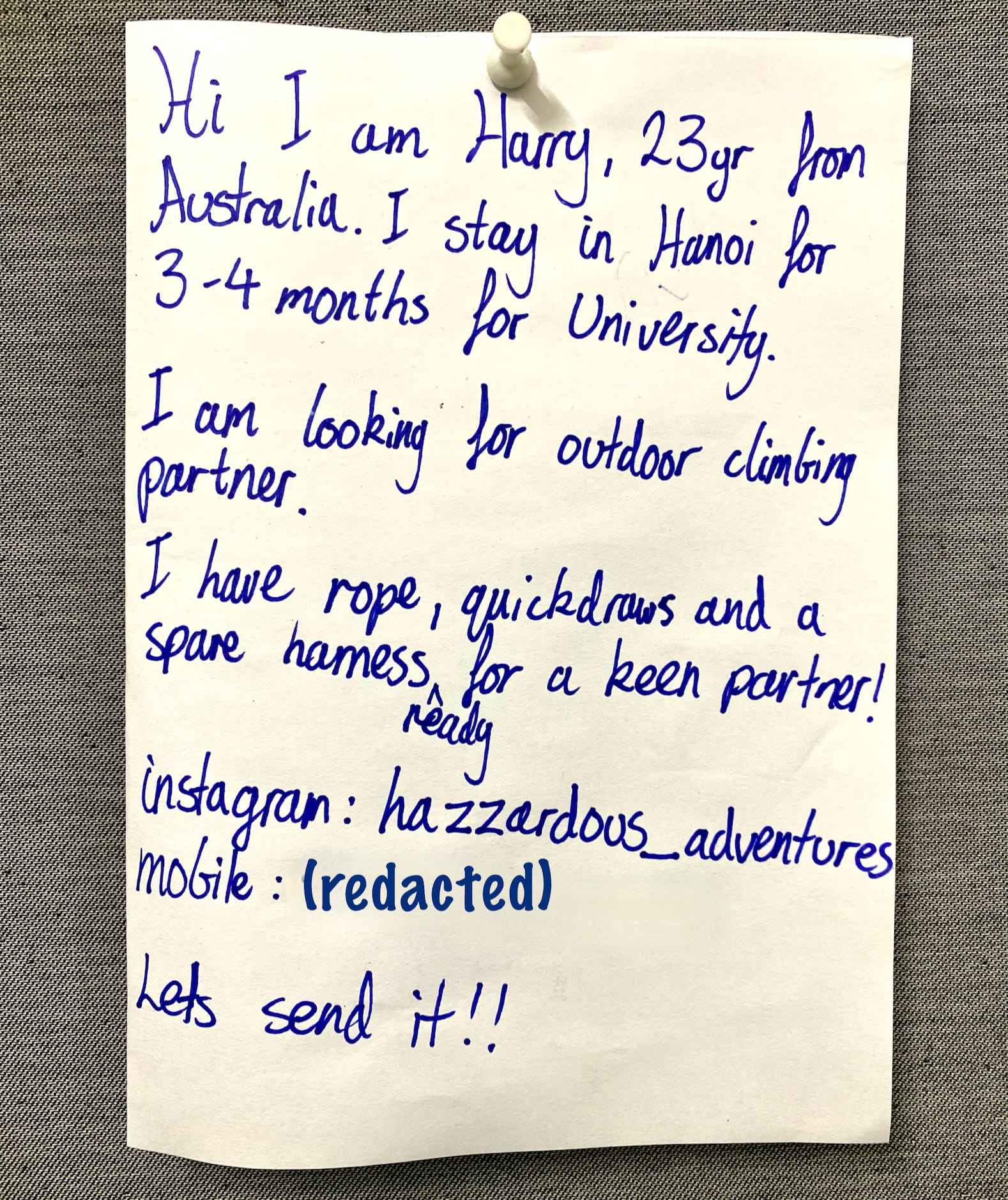
Best of luck to Harry, but with an Instagram handle like that, I would make sure my affairs are in order before scaling outdoor rocks with him.
To Sapa
Next up, we go to the mountainous countryside in northwest Vietnam.
Footnotes
Since the language of this blog is English, I prefer sticking to what things are called in English rather than switching to local words. It’s tempting to switch, because when you travel or learn more about a language, it feels more authentic to write the way it’s written there. But as a reader, I always find this alienating. So I try not to do it. ↩︎
Without accent marks ↩︎
Fight me ↩︎
We were worried about the food sanitation, which made us go light on the herbs. Though food looked pretty clean in general, all the vegetables and herbs are washed in non-drinkable water. Fresh food like that is the main thing they tell you to watch out for if you don’t want a bout of traveler’s bowels. And while I did end up with the worst morning I’d have of the trip so far in Hanoi—likely due to some bacteria somewhere in my recent culinary past—our experience was pretty good. ↩︎
After returning on the first day, the kind woman (she was truly kind) at our hotel said with a smile, “crossing the street here is your worst nightmare, isn’t it?” ↩︎
This experience with mopeds gave me a useful template for understanding other cities as well. Being budget-y travelers, we rely on walking and public transportation almost exclusively. Cities with good metro systems score huge points. E.g., I write this having just left Tainan, Taiwan, a gem of a place but that felt kind of hard to get around (no metro). But, seeing the incredible volume of mopeds both parked and blasting past, I remembered Hanoi. It made me realize we’re probably doing it wrong. Reminds me to give a city the benefit of the doubt. (Seattle, after all, is only walkable to a point, but if you live there I think you still basically need a car.) ↩︎
I wish I had photos—no, actually, videos of the park. It was incredible. Vietnam definitely seems like a morning country. People are out doing all kinds of stuff by 6am. The large central park was a complete cacophony of activity. Zumba, ballroom dancing, badminton, some kind of other dancing, muscle dudes doing muscle things, crossfit squads (maybe?), and old people vigorously performing bizarre movements were all happening right next to each other, each group blasting their own music from PA systems right on top of the others. Speed walkers blasted around on concrete that ringed toxic pits of water. In the middle somewhere was a monkey in a horrid weathered cage, ignored by all. It was nothing short of magic. ↩︎
I have been told that tours in the USA follow a similar format. I have never done a tour in the USA so I can’t comment, but I guess I’m not terribly surprised. I’ve avoided tours in Europe—except those free walking tours, where some poor college student shouts a detailed timeline of the nation’s history at you for three hours—but I wouldn’t be shocked if they’re the same, too. So, let’s go out on a limb and say that tours everywhere largely follow this format. I just said Southeast Asia because that’s the only place I’ve
been subjected tochosen to go on them. ↩︎Helpfully listed in the handy things not provided section is always “Gratuity for your guide (recommended)” ↩︎
They were actually good peanuts. ↩︎
I’m getting a kick out of writing this all cynically. I met an interesting couple from Luxembourg—first people I’d ever met from that country!—and enjoyed talking to them throughout the rest of the day. ↩︎
Both true examples of things we were earnestly recommended by other travelers while in Hanoi. We did neither of them. ↩︎
Literally no idea who. What a weird thing to write. But it’s true. ↩︎
To get bicycles we stopped by a shed with hundreds, if not thousands in them. There was no formal checkout procedure. I couldn’t help but appreciate the well-greased network of business deals operating in the background. ↩︎
Boat boarding also an operation of shocking scale. We arrive at waterfront with stadium seating. Hundreds of boats with rowers await. A quick queue forms for our group, and we sail off. ↩︎
I.e., so they can just return them later. Of the dozen or so other boats I saw at the snack zone, we were the only ones who resisted any purchases. ↩︎
We did a trip to Sapa in the middle of our time in Hanoi, so it wasn’t just the Ninh Binh trip that wore us out. ↩︎
Ninh Binh & Guilin, China ↩︎
I found out by emailing some companies that the less crowded alternative I read about—Bai Tu Long Bay—was no longer offered as a day trip, so we wouldn’t have been able to go and avoid an overnighter. ↩︎
